Self Describe Quotes & Sayings
Enjoy reading and share 86 famous quotes about Self Describe with everyone.
Top Self Describe Quotes
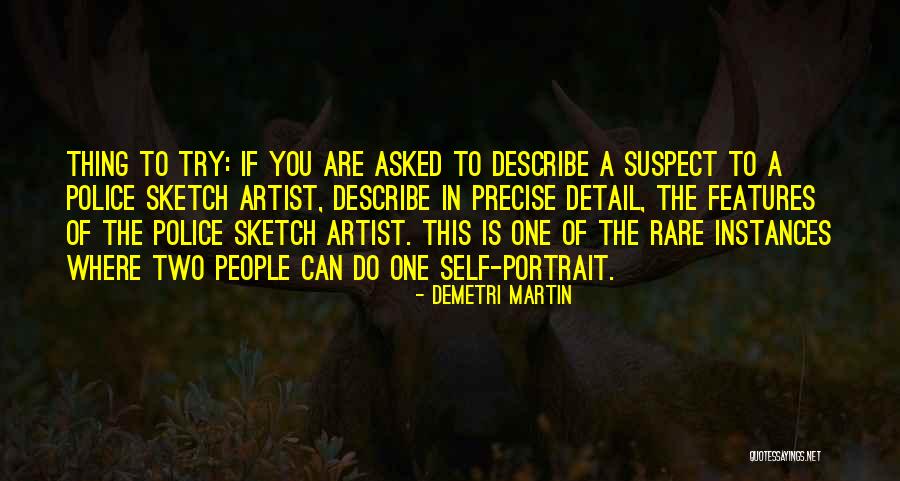
THING TO TRY: If you are asked to describe a suspect to a police sketch artist, describe in precise detail, the features of the police sketch artist. This is one of the rare instances where two people can do one self-portrait. — Demetri Martin
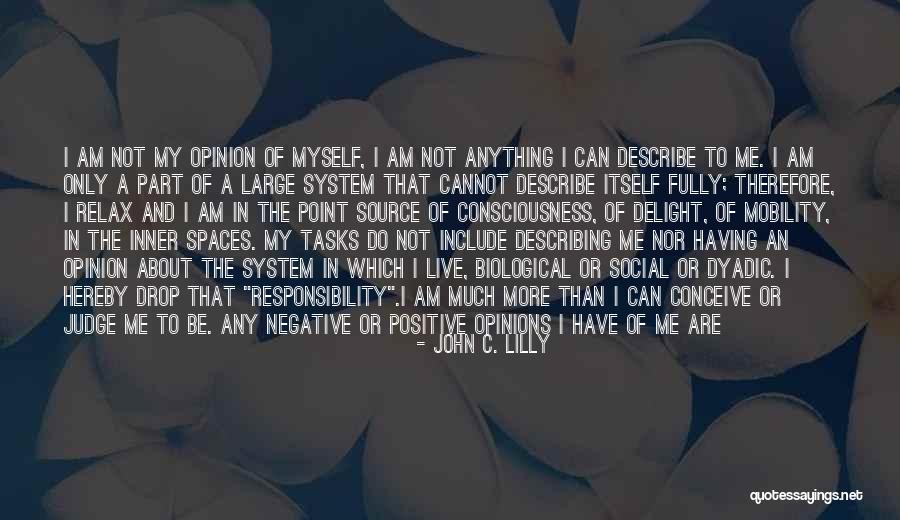
I am not my opinion of myself, I am not anything I can describe to me. I am only a part of a large system that cannot describe itself fully; therefore, I relax and I am in the point source of consciousness, of delight, of mobility, in the inner spaces. My tasks do not include describing me nor having an opinion about the system in which I live, biological or social or dyadic. I hereby drop that "responsibility".
I am much more than I can conceive or judge me to be. Any negative or positive opinions I have of me are false fronts, headlines, limited and unnecessary programmes written on a thin paper blowing about and floating around in the vastness of inner spaces. — John C. Lilly
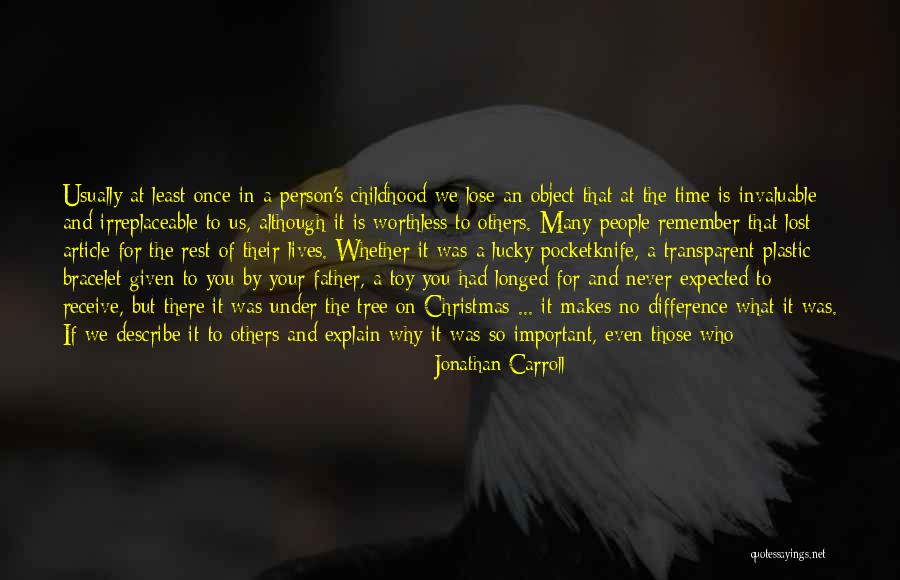
Usually at least once in a person's childhood we lose an object that at the time is invaluable and irreplaceable to us, although it is worthless to others. Many people remember that lost article for the rest of their lives. Whether it was a lucky pocketknife, a transparent plastic bracelet given to you by your father, a toy you had longed for and never expected to receive, but there it was under the tree on Christmas ... it makes no difference what it was. If we describe it to others and explain why it was so important, even those who love us smile indulgently because to them it sounds like a trivial thing to lose. Kid stuff. But it is not. Those who forget about this object have lost a valuable, perhaps even crucial memory. Becuase something central to our younger self resided in that thing. When we lost it, for whatever reason, a part of us shifted permanently. — Jonathan Carroll
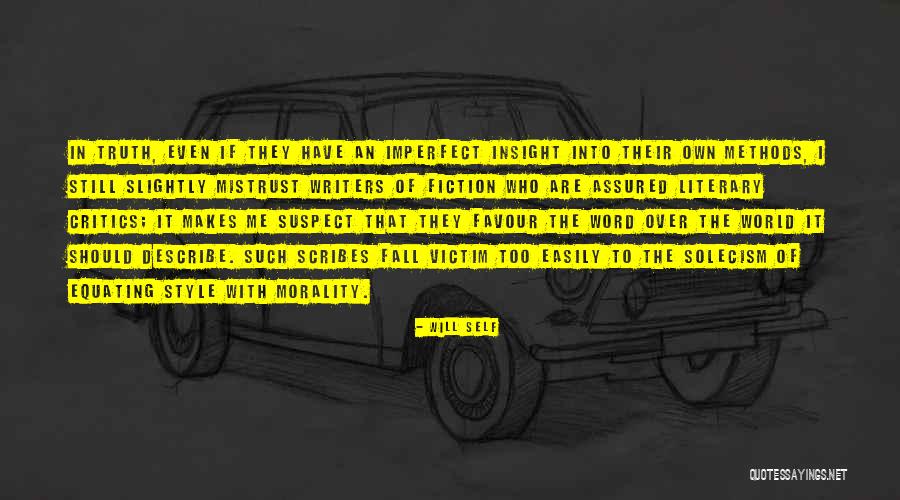
In truth, even if they have an imperfect insight into their own methods, I still slightly mistrust writers of fiction who are assured literary critics; it makes me suspect that they favour the word over the world it should describe. Such scribes fall victim too easily to the solecism of equating style with morality. — Will Self
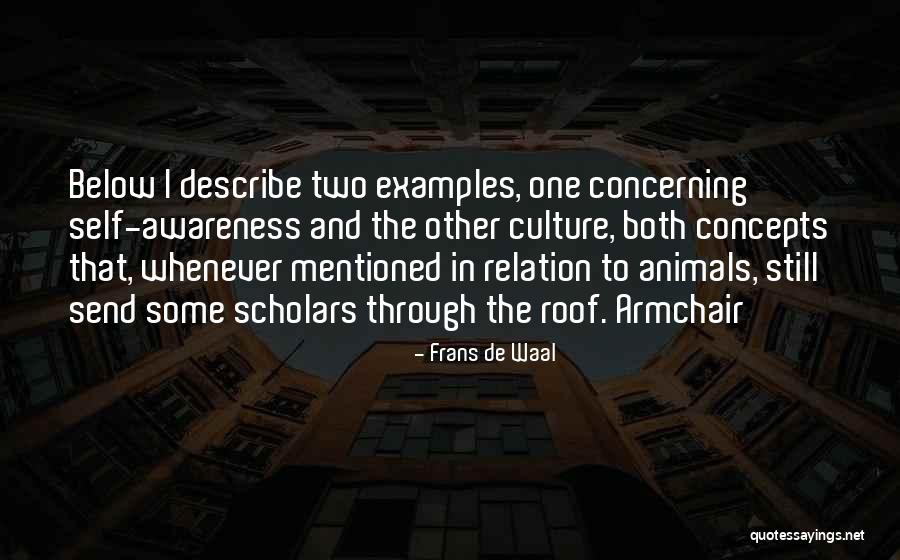
Below I describe two examples, one concerning self-awareness and the other culture, both concepts that, whenever mentioned in relation to animals, still send some scholars through the roof. Armchair — Frans De Waal
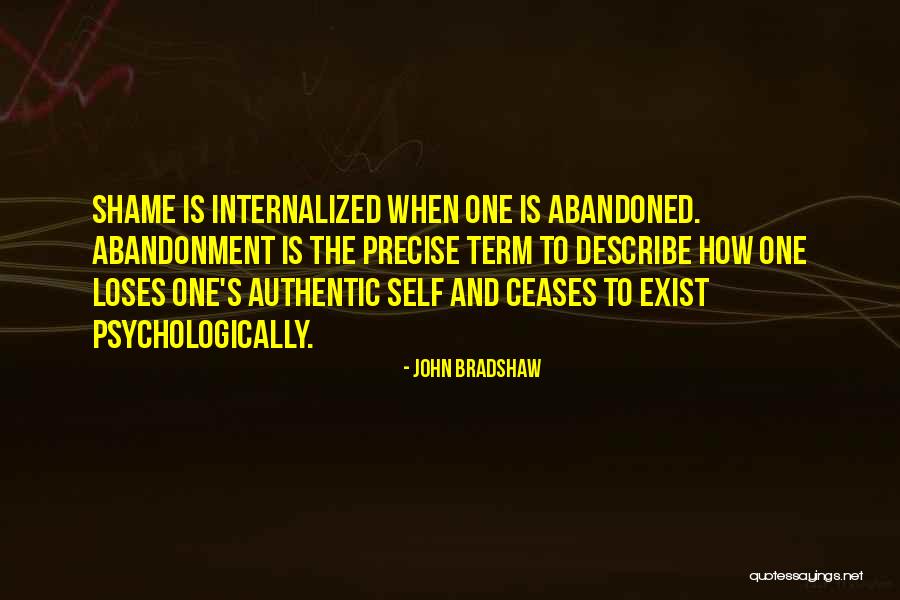
Shame is internalized when one is abandoned. Abandonment is the precise term to describe how one loses one's authentic self and ceases to exist psychologically. — John Bradshaw
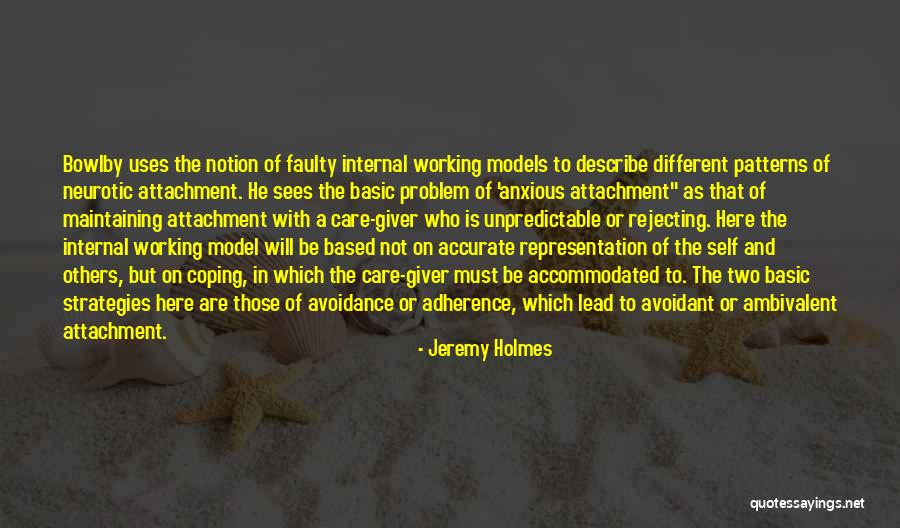
Bowlby uses the notion of faulty internal working models to describe different patterns of neurotic attachment. He sees the basic problem of 'anxious attachment" as that of maintaining attachment with a care-giver who is unpredictable or rejecting. Here the internal working model will be based not on accurate representation of the self and others, but on coping, in which the care-giver must be accommodated to. The two basic strategies here are those of avoidance or adherence, which lead to avoidant or ambivalent attachment. — Jeremy Holmes
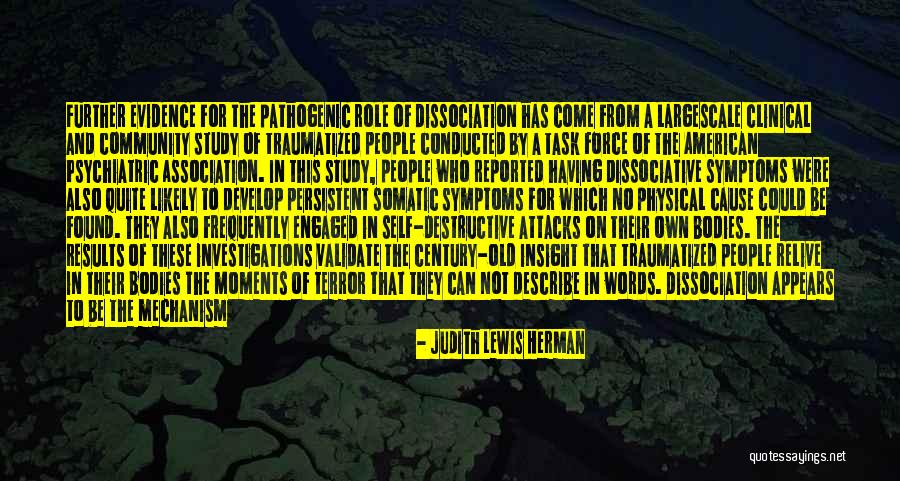
Further evidence for the pathogenic role of dissociation has come from a largescale clinical and community study of traumatized people conducted by a task force of the American Psychiatric Association. In this study, people who reported having dissociative symptoms were also quite likely to develop persistent somatic symptoms for which no physical cause could be found. They also frequently engaged in self-destructive attacks on their own bodies. The results of these investigations validate the century-old insight that traumatized people relive in their bodies the moments of terror that they can not describe in words. Dissociation appears to be the mechanism by which intense sensory and emotional experiences are disconnected from the social domain of language and memory, the internal mechanism by which terrorized people are silenced. — Judith Lewis Herman
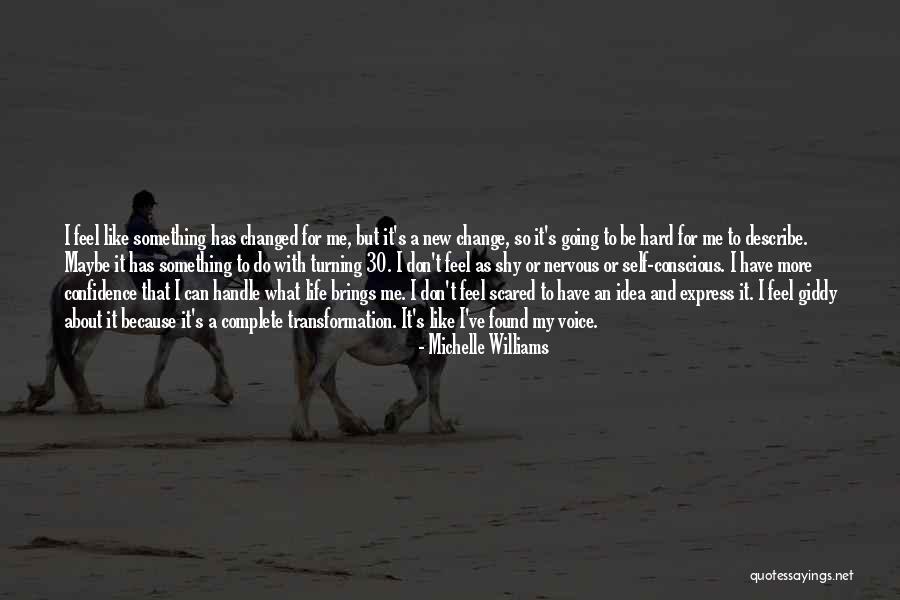
I feel like something has changed for me, but it's a new change, so it's going to be hard for me to describe. Maybe it has something to do with turning 30. I don't feel as shy or nervous or self-conscious. I have more confidence that I can handle what life brings me. I don't feel scared to have an idea and express it. I feel giddy about it because it's a complete transformation. It's like I've found my voice. — Michelle Williams
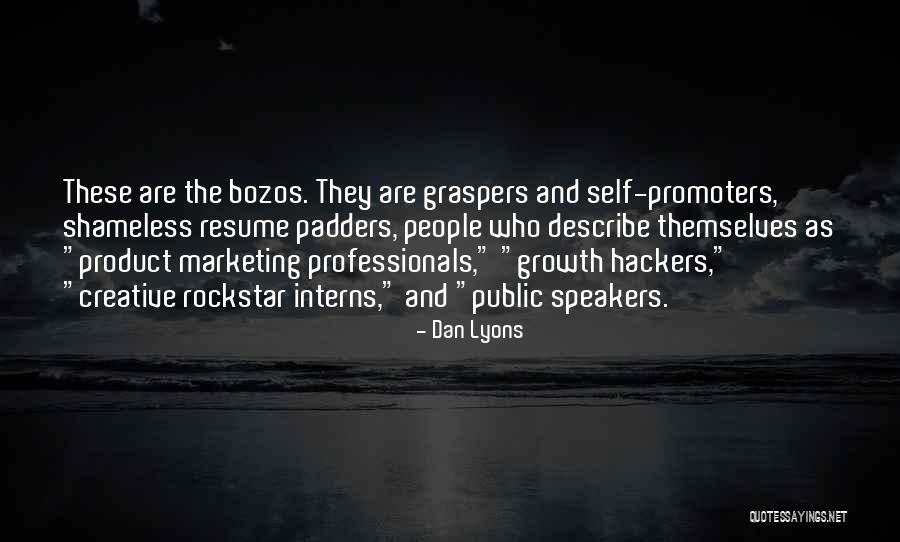
These are the bozos. They are graspers and self-promoters, shameless resume padders, people who describe themselves as "product marketing professionals," "growth hackers," "creative rockstar interns," and "public speakers. — Dan Lyons
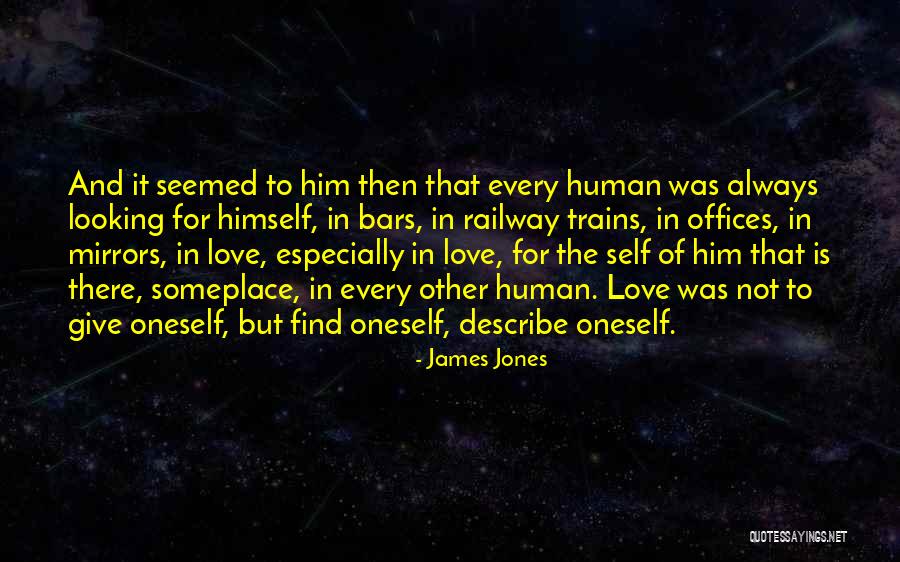
And it seemed to him then that every human was always looking for himself, in bars, in railway trains, in offices, in mirrors, in love, especially in love, for the self of him that is there, someplace, in every other human. Love was not to give oneself, but find oneself, describe oneself. — James Jones
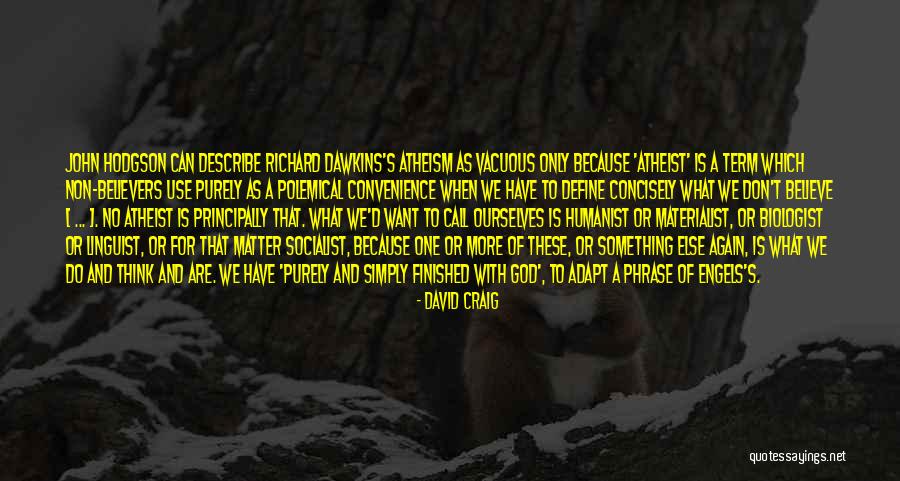
John Hodgson can describe Richard Dawkins's atheism as vacuous only because 'atheist' is a term which non-believers use purely as a polemical convenience when we have to define concisely what we don't believe [ ... ]. No atheist is principally that. What we'd want to call ourselves is humanist or materialist, or biologist or linguist, or for that matter socialist, because one or more of these, or something else again, is what we do and think and are. We have 'purely and simply finished with God', to adapt a phrase of Engels's. — David Craig
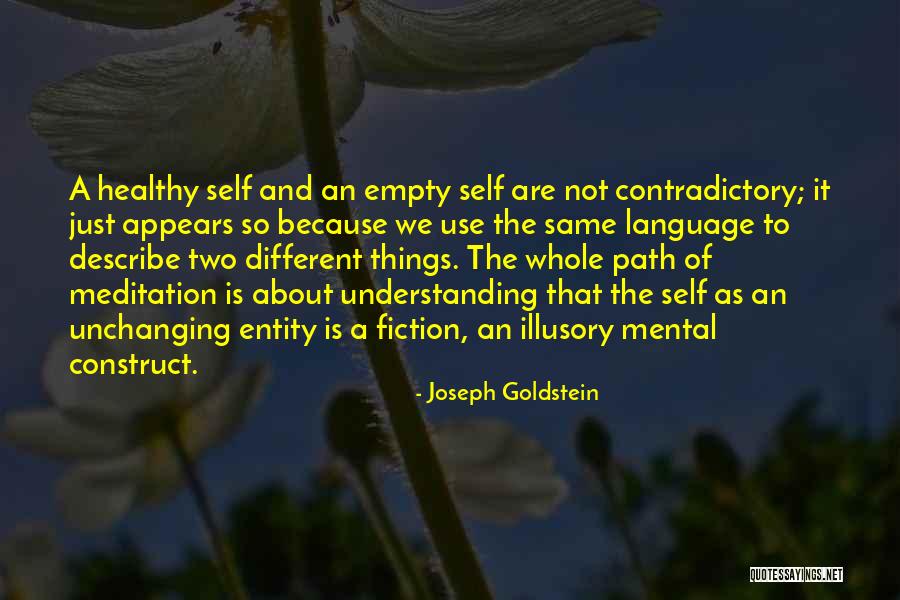
A healthy self and an empty self are not contradictory; it just appears so because we use the same language to describe two different things. The whole path of meditation is about understanding that the self as an unchanging entity is a fiction, an illusory mental construct. — Joseph Goldstein
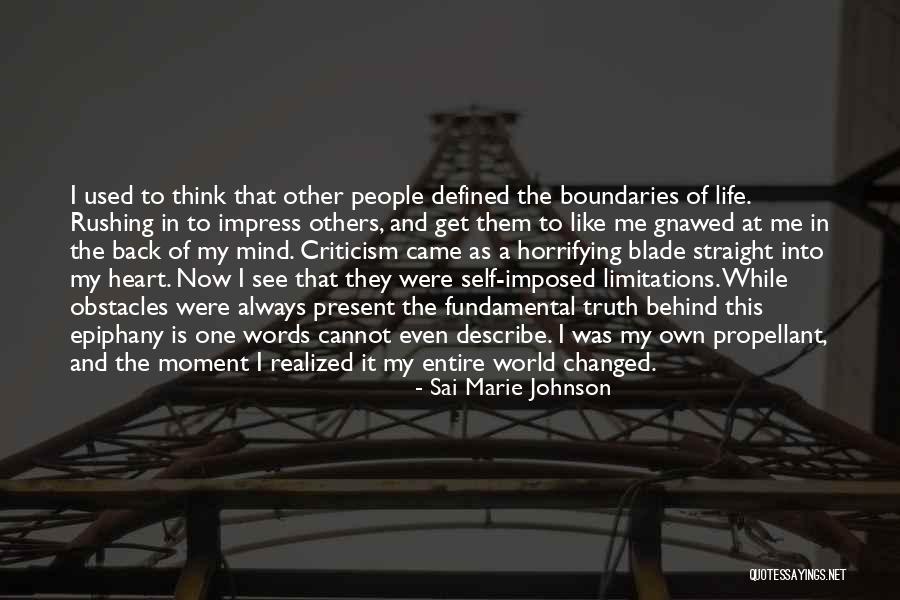
I used to think that other people defined the boundaries of life. Rushing in to impress others, and get them to like me gnawed at me in the back of my mind. Criticism came as a horrifying blade straight into my heart. Now I see that they were self-imposed limitations. While obstacles were always present the fundamental truth behind this epiphany is one words cannot even describe. I was my own propellant, and the moment I realized it my entire world changed. — Sai Marie Johnson
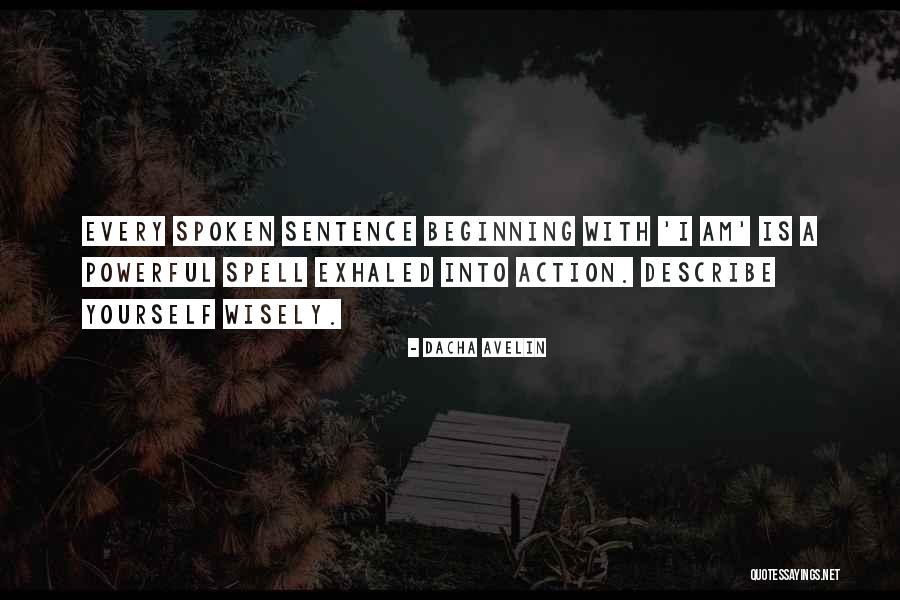
Every spoken sentence beginning with 'I Am' is a powerful spell exhaled into action. Describe yourself wisely. — Dacha Avelin
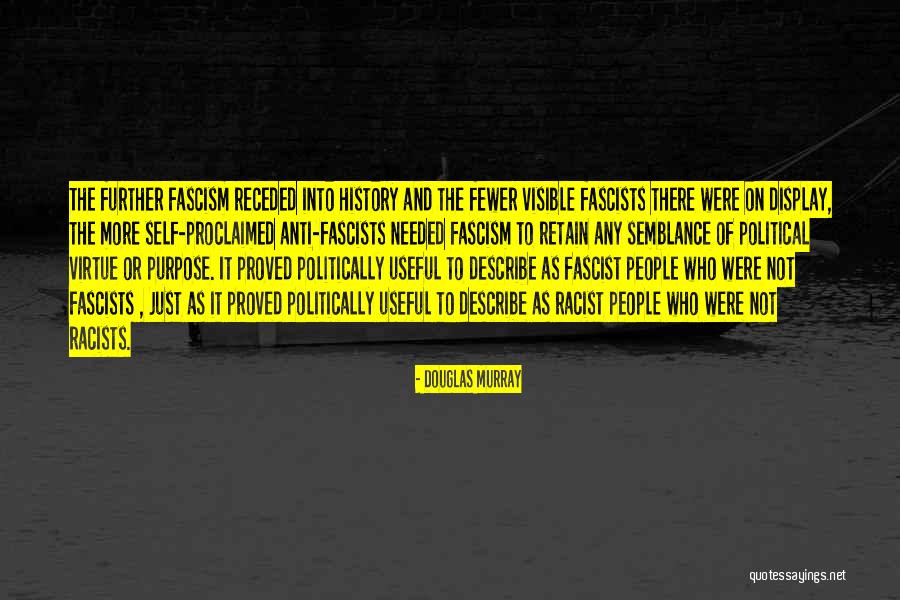
The further Fascism receded into history and the fewer visible fascists there were on display, the more self-proclaimed anti-fascists needed fascism to retain any semblance of political virtue or purpose. It proved politically useful to describe as fascist people who were not Fascists , just as it proved politically useful to describe as racist people who were not racists. — Douglas Murray
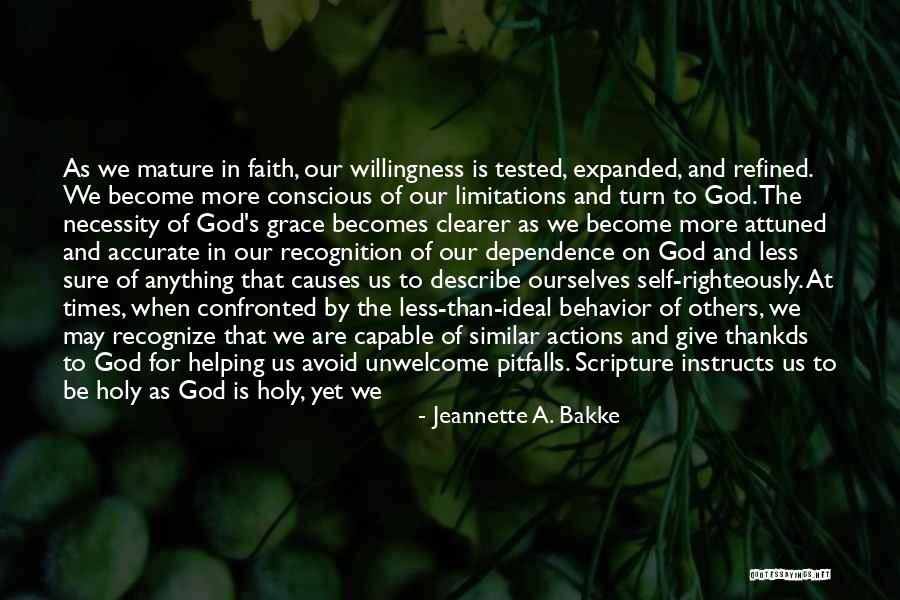
As we mature in faith, our willingness is tested, expanded, and refined. We become more conscious of our limitations and turn to God. The necessity of God's grace becomes clearer as we become more attuned and accurate in our recognition of our dependence on God and less sure of anything that causes us to describe ourselves self-righteously. At times, when confronted by the less-than-ideal behavior of others, we may recognize that we are capable of similar actions and give thankds to God for helping us avoid unwelcome pitfalls. Scripture instructs us to be holy as God is holy, yet we increasingly realize the impossibility of holy behavior unless it is brought about by the Spirit's empowerment and our willing responsiveness and cooperation. Many people use spiritual direction as a window through which to notice and attend to their own expectations of willingness and willfulness. — Jeannette A. Bakke

She knew that the only love her demon was capable of was self-destructive, cruel, vampiric, parasitic, and all the other words her best friends had used to describe Jerry, Alec, Christian, Matt, and the others whose names, faces, and genitalia had now blurred together in her memories. They were men incapable of love yet able to inspire suicide threats. — Nancy A. Collins

He's rich, handsome and dangerous. You like that."
She smiled at the uncharacteristic lack of self-confidence in his tone. "My dear duke. You are rich, handsome and dangerous."
His lips lifted on one side. "I would never describe myself as dangerous."
"Could you maybe stop talking? I'd like to kiss you but your lips won't stay still."
Eyes twinkling, he pressed his lips shut. Finley smiled and guided his head down to hers. — Kady Cross
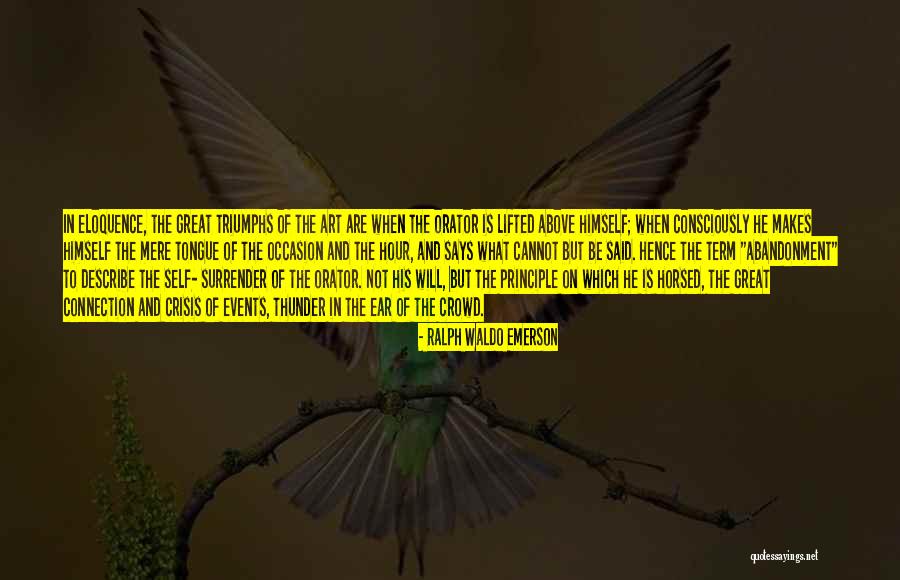
In eloquence, the great triumphs of the art are when the orator is lifted above himself; when consciously he makes himself the mere tongue of the occasion and the hour, and says what cannot but be said. Hence the term "abandonment" to describe the self- surrender of the orator. Not his will, but the principle on which he is horsed, the great connection and crisis of events, thunder in the ear of the crowd. — Ralph Waldo Emerson
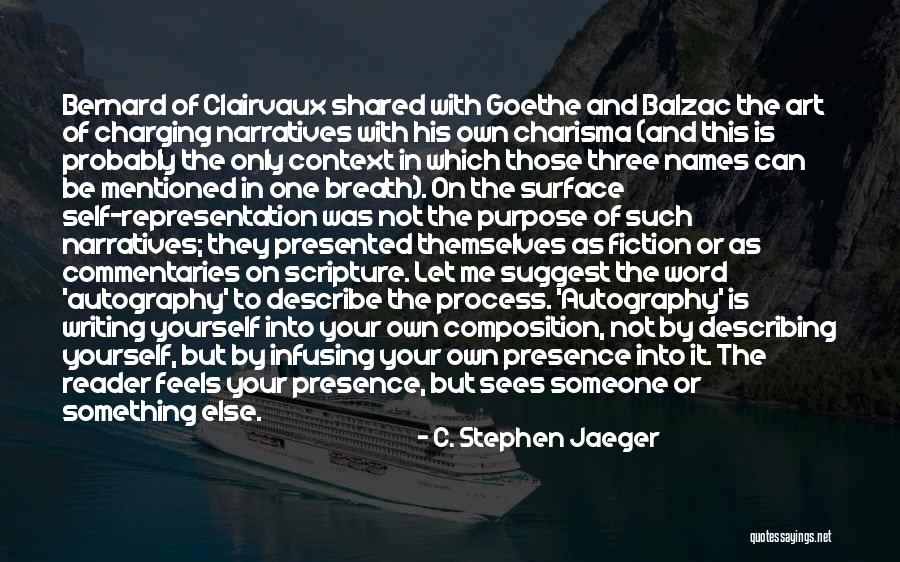
Bernard of Clairvaux shared with Goethe and Balzac the art of charging narratives with his own charisma (and this is probably the only context in which those three names can be mentioned in one breath). On the surface self-representation was not the purpose of such narratives; they presented themselves as fiction or as commentaries on scripture. Let me suggest the word 'autography' to describe the process. 'Autography' is writing yourself into your own composition, not by describing yourself, but by infusing your own presence into it. The reader feels your presence, but sees someone or something else. — C. Stephen Jaeger
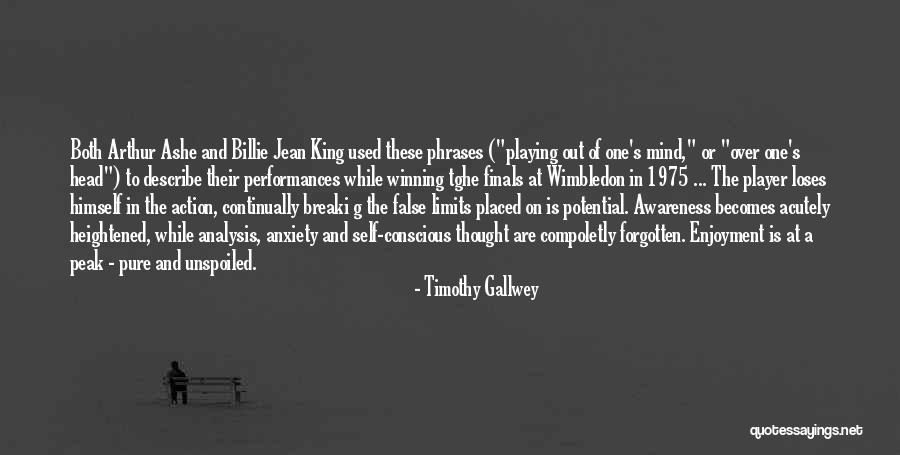
Both Arthur Ashe and Billie Jean King used these phrases ("playing out of one's mind," or "over one's head") to describe their performances while winning tghe finals at Wimbledon in 1975 ... The player loses himself in the action, continually breaki g the false limits placed on is potential. Awareness becomes acutely heightened, while analysis, anxiety and self-conscious thought are compoletly forgotten. Enjoyment is at a peak - pure and unspoiled. — Timothy Gallwey
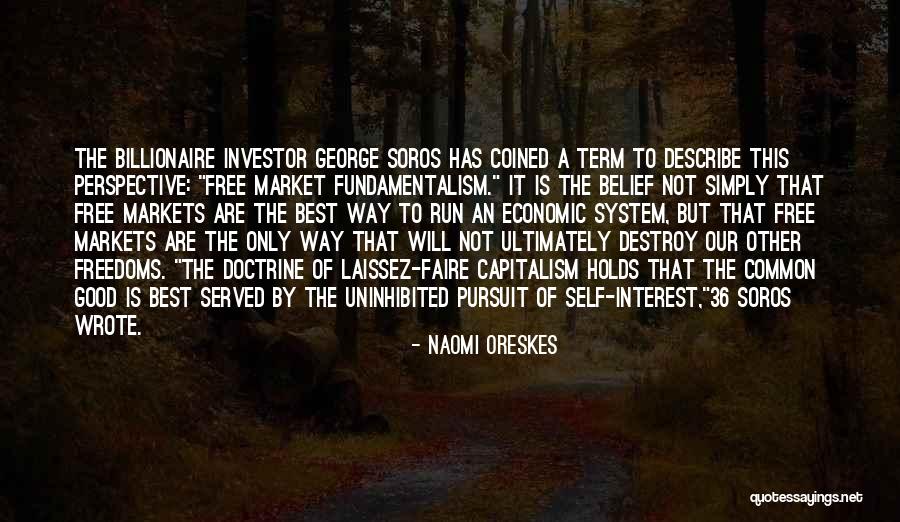
The billionaire investor George Soros has coined a term to describe this perspective: "free market fundamentalism." It is the belief not simply that free markets are the best way to run an economic system, but that free markets are the only way that will not ultimately destroy our other freedoms. "The doctrine of laissez-faire capitalism holds that the common good is best served by the uninhibited pursuit of self-interest,"36 Soros wrote. — Naomi Oreskes
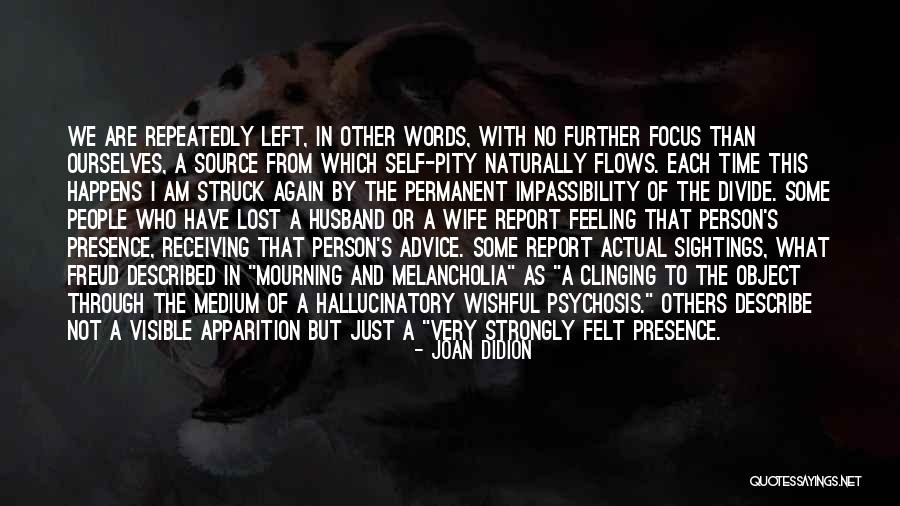
We are repeatedly left, in other words, with no further focus than ourselves, a source from which self-pity naturally flows. Each time this happens I am struck again by the permanent impassibility of the divide. Some people who have lost a husband or a wife report feeling that person's presence, receiving that person's advice. Some report actual sightings, what Freud described in "Mourning and Melancholia" as "a clinging to the object through the medium of a hallucinatory wishful psychosis." Others describe not a visible apparition but just a "very strongly felt presence. — Joan Didion
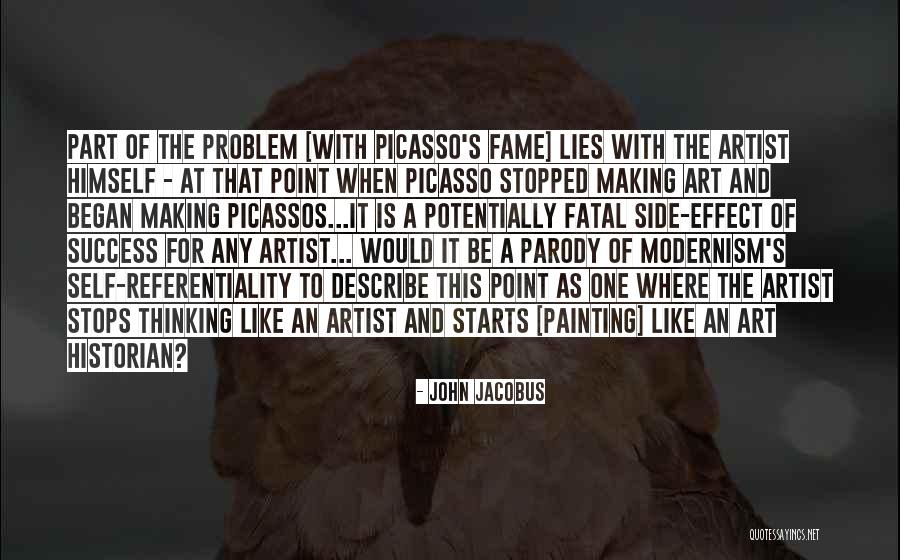
Part of the problem [with Picasso's fame] lies with the artist himself - at that point when Picasso stopped making art and began making Picassos...it is a potentially fatal side-effect of success for any artist... Would it be a parody of modernism's self-referentiality to describe this point as one where the artist stops thinking like an artist and starts [painting] like an art historian? — John Jacobus
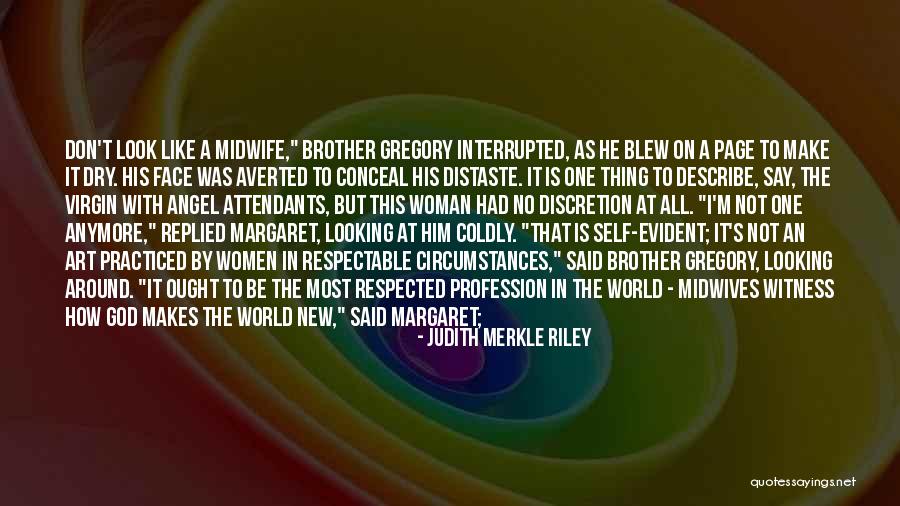
DON'T LOOK LIKE a midwife," Brother Gregory interrupted, as he blew on a page to make it dry. His face was averted to conceal his distaste. It is one thing to describe, say, the Virgin with angel attendants, but this woman had no discretion at all. "I'm not one anymore," replied Margaret, looking at him coldly. "That is self-evident; it's not an art practiced by women in respectable circumstances," said Brother Gregory, looking around. "It ought to be the most respected profession in the world - midwives witness how God makes the world new," said Margaret; — Judith Merkle Riley
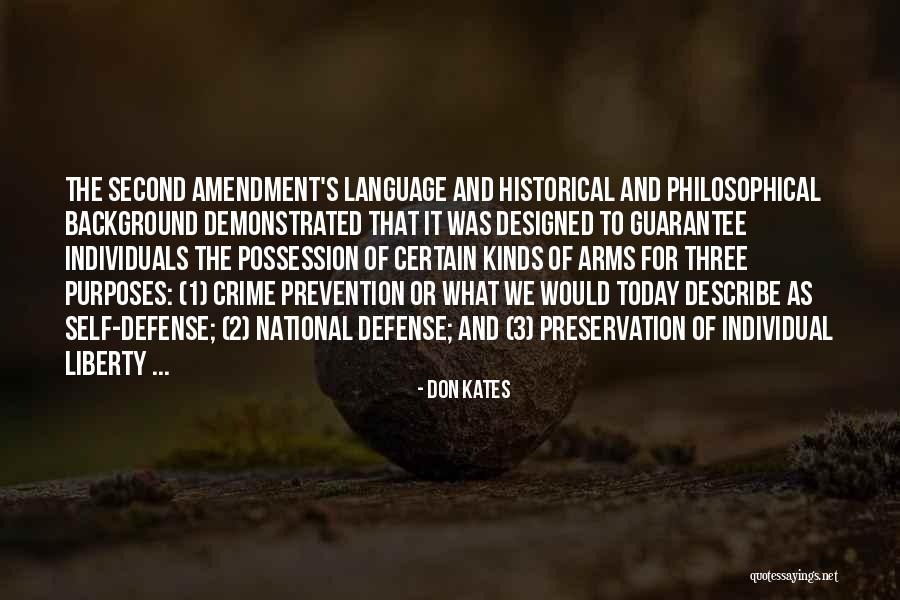
The Second Amendment's language and historical and philosophical background demonstrated that it was designed to guarantee individuals the possession of certain kinds of arms for three purposes: (1) crime prevention or what we would today describe as self-defense; (2) national defense; and (3) preservation of individual liberty ... — Don Kates
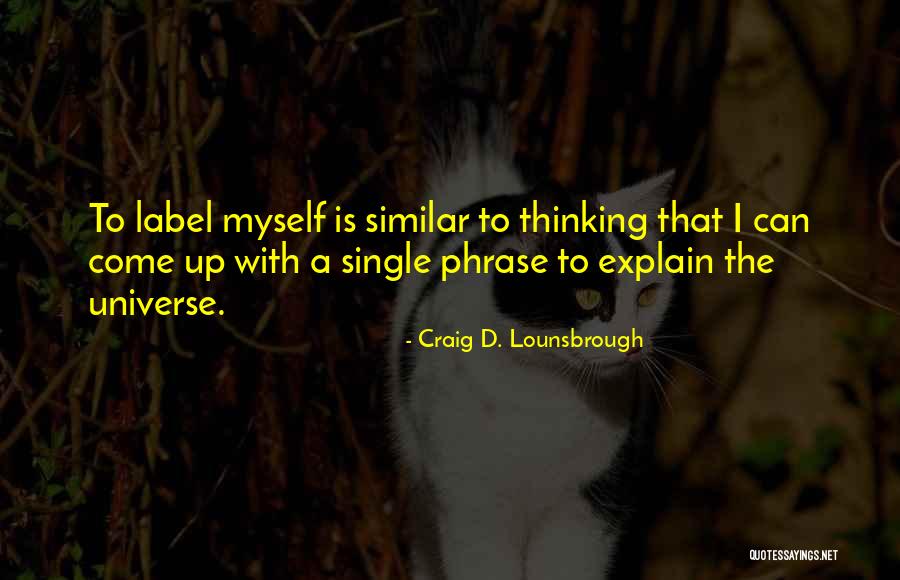
To label myself is similar to thinking that I can come up with a single phrase to explain the universe. — Craig D. Lounsbrough
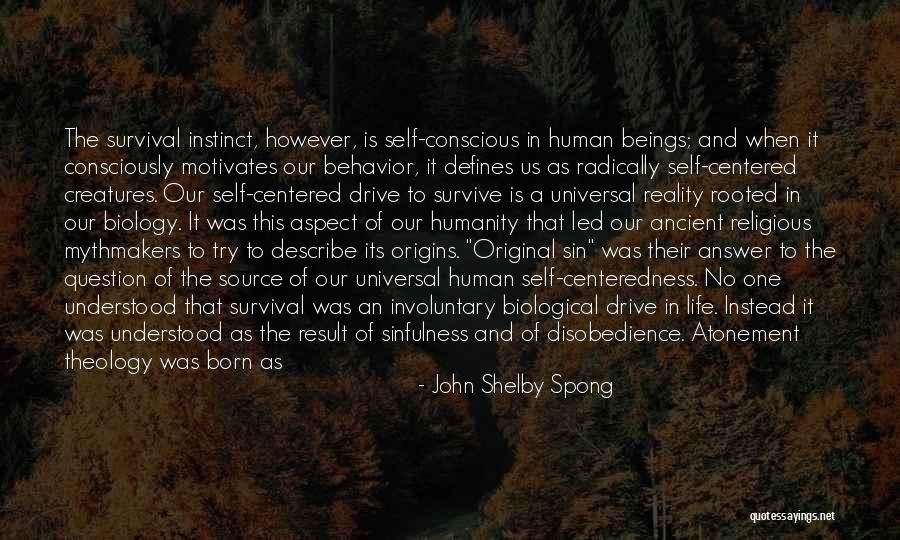
The survival instinct, however, is self-conscious in human beings; and when it consciously motivates our behavior, it defines us as radically self-centered creatures. Our self-centered drive to survive is a universal reality rooted in our biology. It was this aspect of our humanity that led our ancient religious mythmakers to try to describe its origins. "Original sin" was their answer to the question of the source of our universal human self-centeredness. No one understood that survival was an involuntary biological drive in life. Instead it was understood as the result of sinfulness and of disobedience. Atonement theology was born as a way to address this universal flaw in our understanding of human life. — John Shelby Spong
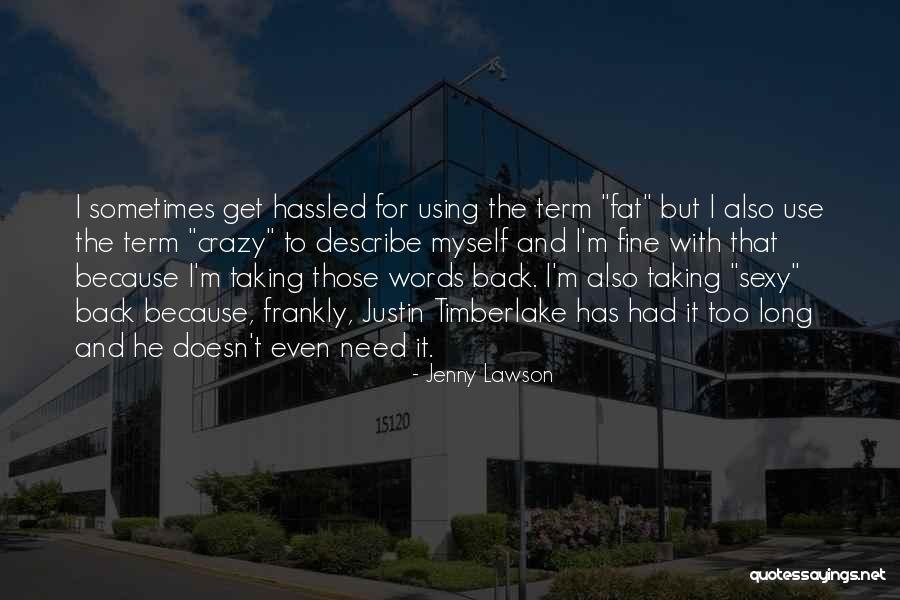
I sometimes get hassled for using the term "fat" but I also use the term "crazy" to describe myself and I'm fine with that because I'm taking those words back. I'm also taking "sexy" back because, frankly, Justin Timberlake has had it too long and he doesn't even need it. — Jenny Lawson
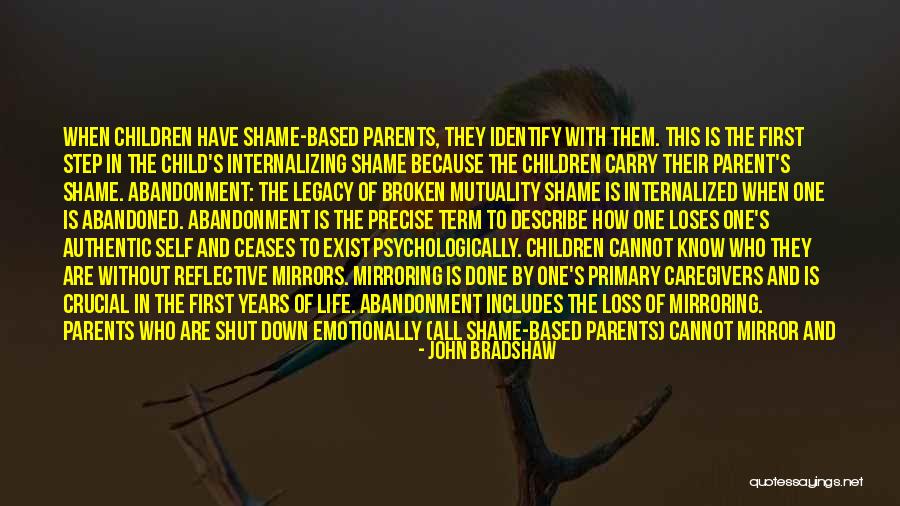
When children have shame-based parents, they identify with them. This is the first step in the child's internalizing shame because the children carry their parent's shame. ABANDONMENT: THE LEGACY OF BROKEN MUTUALITY Shame is internalized when one is abandoned. Abandonment is the precise term to describe how one loses one's authentic self and ceases to exist psychologically. Children cannot know who they are without reflective mirrors. Mirroring is done by one's primary caregivers and is crucial in the first years of life. Abandonment includes the loss of mirroring. Parents who are shut down emotionally (all shame-based parents) cannot mirror and affirm their children's emotions. — John Bradshaw
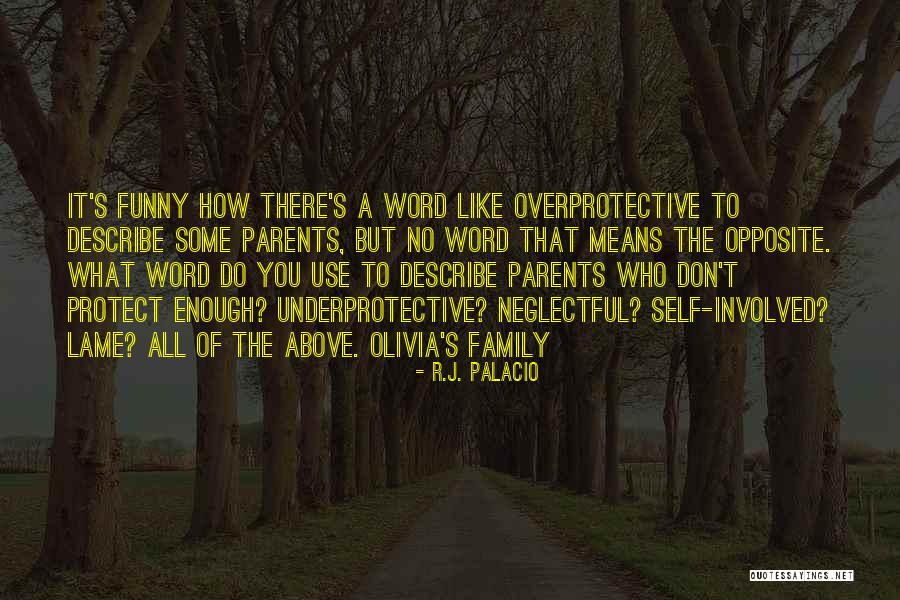
It's funny how there's a word like overprotective to describe some parents, but no word that means the opposite. what word do you use to describe parents who don't protect enough? underprotective? neglectful? self-involved? lame? all of the above. olivia's family — R.J. Palacio
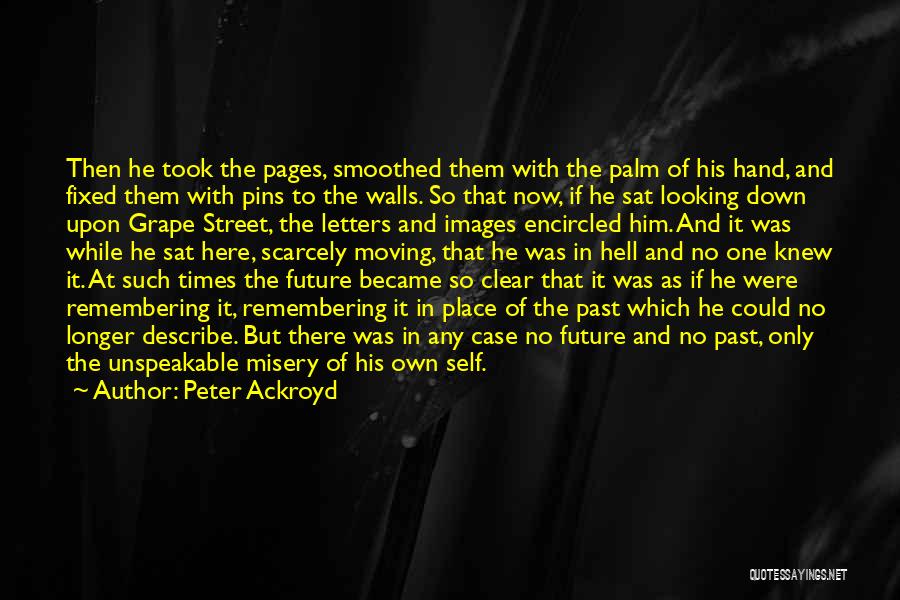
Then he took the pages, smoothed them with the palm of his hand, and fixed them with pins to the walls. So that now, if he sat looking down upon Grape Street, the letters and images encircled him. And it was while he sat here, scarcely moving, that he was in hell and no one knew it. At such times the future became so clear that it was as if he were remembering it, remembering it in place of the past which he could no longer describe. But there was in any case no future and no past, only the unspeakable misery of his own self. — Peter Ackroyd
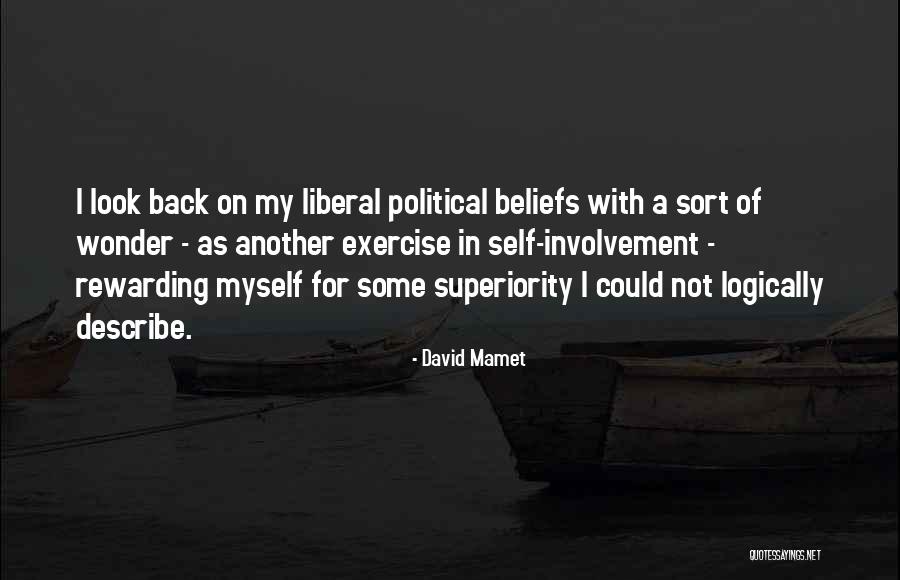
I look back on my liberal political beliefs with a sort of wonder - as another exercise in self-involvement - rewarding myself for some superiority I could not logically describe. — David Mamet
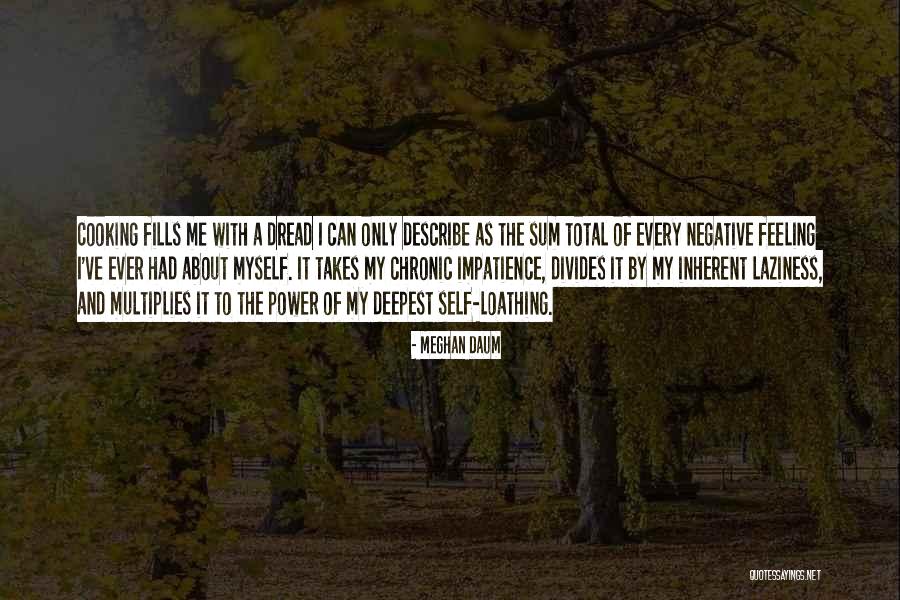
Cooking fills me with a dread I can only describe as the sum total of every negative feeling I've ever had about myself. It takes my chronic impatience, divides it by my inherent laziness, and multiplies it to the power of my deepest self-loathing. — Meghan Daum
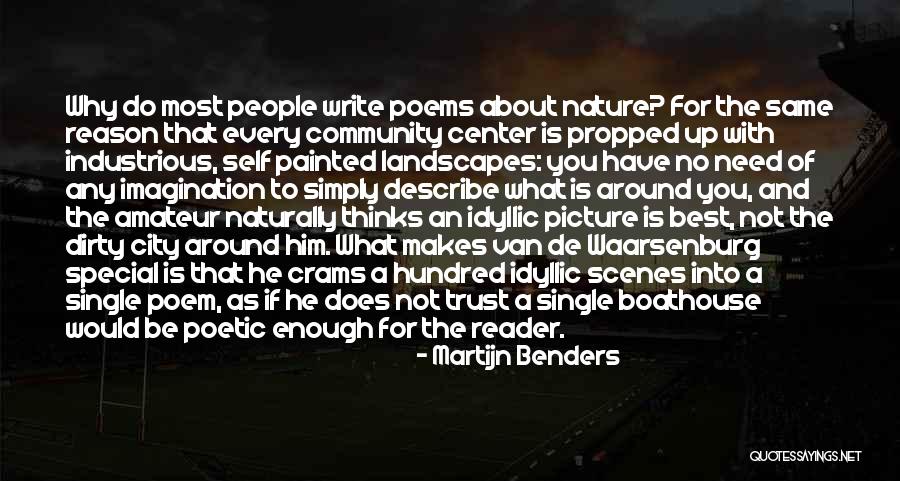
Why do most people write poems about nature? For the same reason that every community center is propped up with industrious, self painted landscapes: you have no need of any imagination to simply describe what is around you, and the amateur naturally thinks an idyllic picture is best, not the dirty city around him. What makes van de Waarsenburg special is that he crams a hundred idyllic scenes into a single poem, as if he does not trust a single boathouse would be poetic enough for the reader. — Martijn Benders
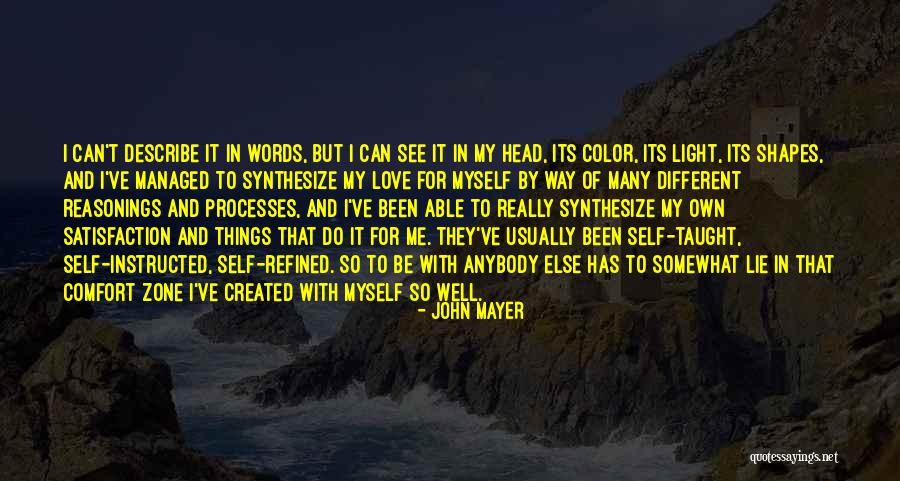
I can't describe it in words, but I can see it in my head, its color, its light, its shapes, and I've managed to synthesize my love for myself by way of many different reasonings and processes, and I've been able to really synthesize my own satisfaction and things that do it for me. They've usually been self-taught, self-instructed, self-refined. So to be with anybody else has to somewhat lie in that comfort zone I've created with myself so well. — John Mayer
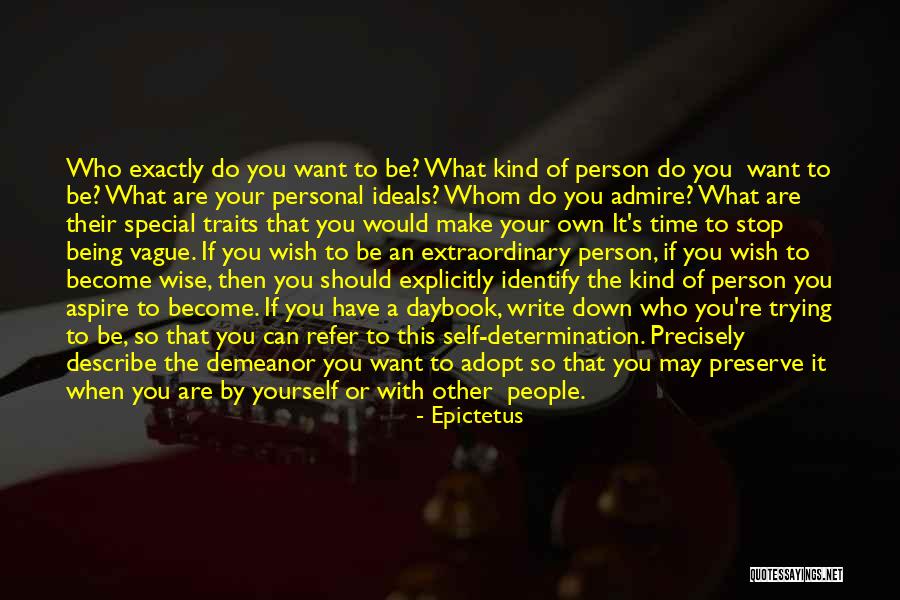
Who exactly do you want to be? What kind of person do you
want to be? What are your personal ideals? Whom do you admire? What are their special traits that you would make your own It's time to stop being vague. If you wish to be an extraordinary person, if you wish to become wise, then you should explicitly identify the kind of person you aspire to become. If you have a daybook, write down who you're trying to be, so that you can refer to this self-determination. Precisely describe the demeanor you want to adopt so that you may preserve it when you are by yourself or with other
people. — Epictetus
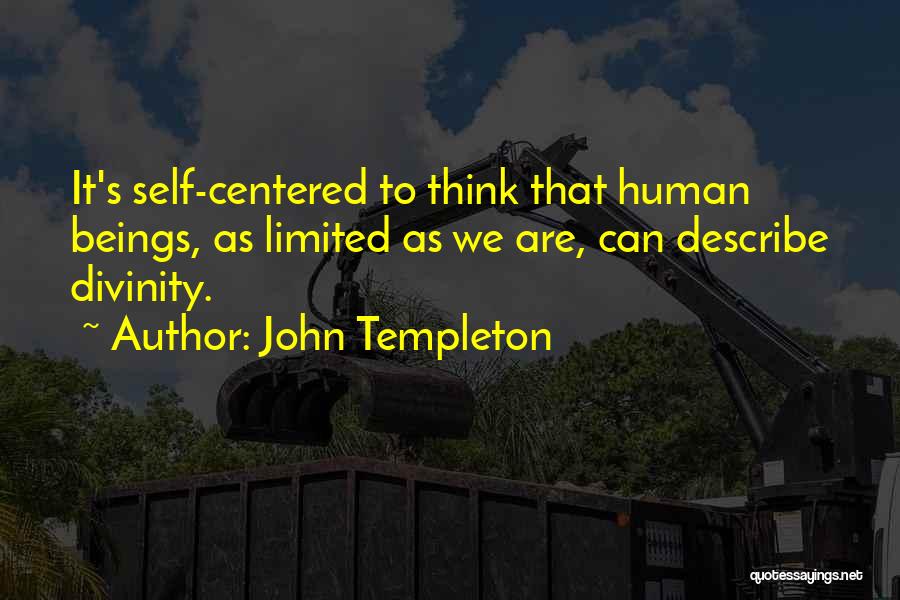
It's self-centered to think that human beings, as limited as we are, can describe divinity. — John Templeton
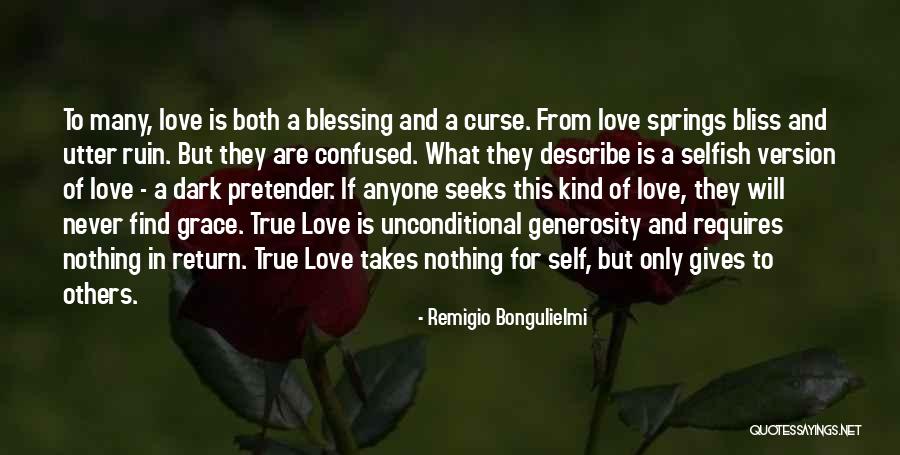
To many, love is both a blessing and a curse. From love springs bliss and utter ruin. But they are confused. What they describe is a selfish version of love - a dark pretender. If anyone seeks this kind of love, they will never find grace. True Love is unconditional generosity and requires nothing in return. True Love takes nothing for self, but only gives to others. — Remigio Bongulielmi
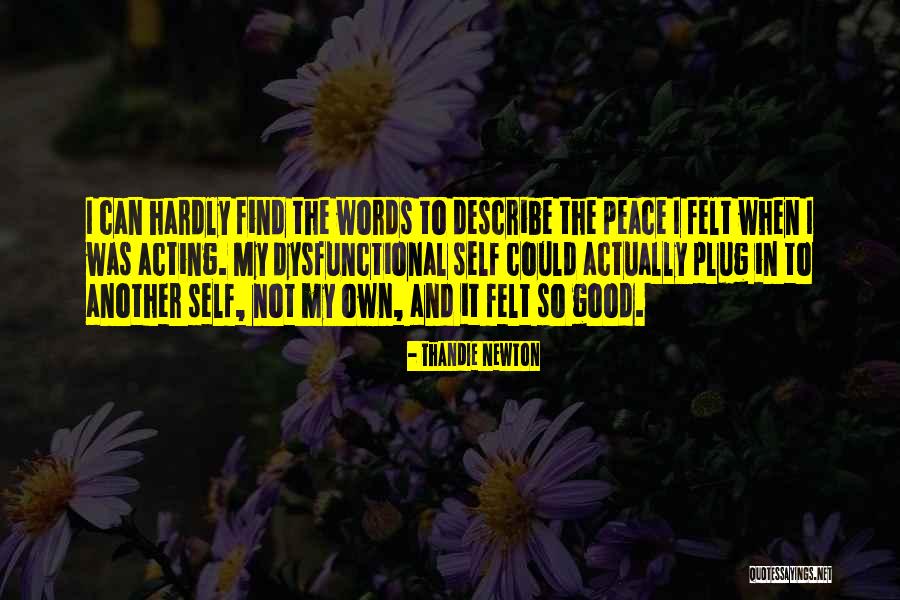
I can hardly find the words to describe the peace I felt when I was acting. My dysfunctional self could actually plug in to another self, not my own, and it felt so good. — Thandie Newton
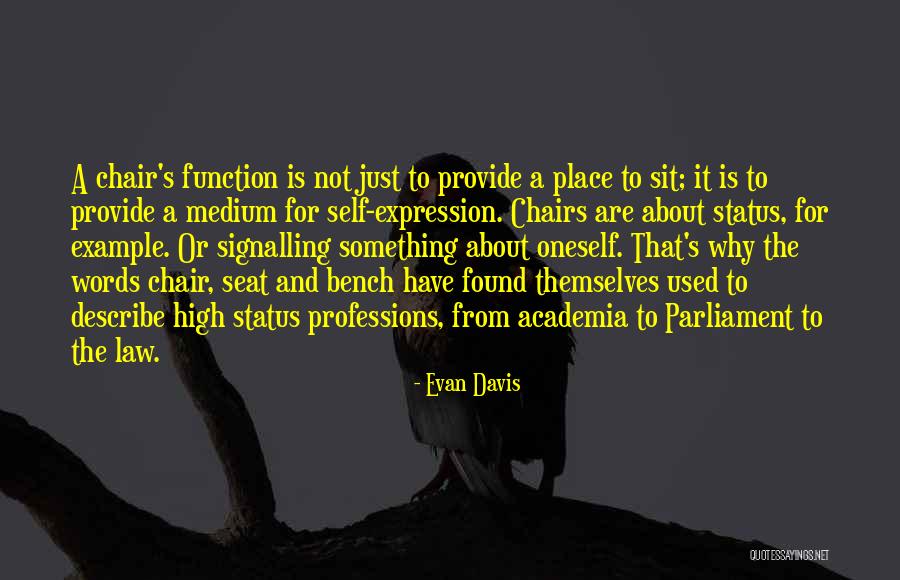
A chair's function is not just to provide a place to sit; it is to provide a medium for self-expression. Chairs are about status, for example. Or signalling something about oneself. That's why the words chair, seat and bench have found themselves used to describe high status professions, from academia to Parliament to the law. — Evan Davis
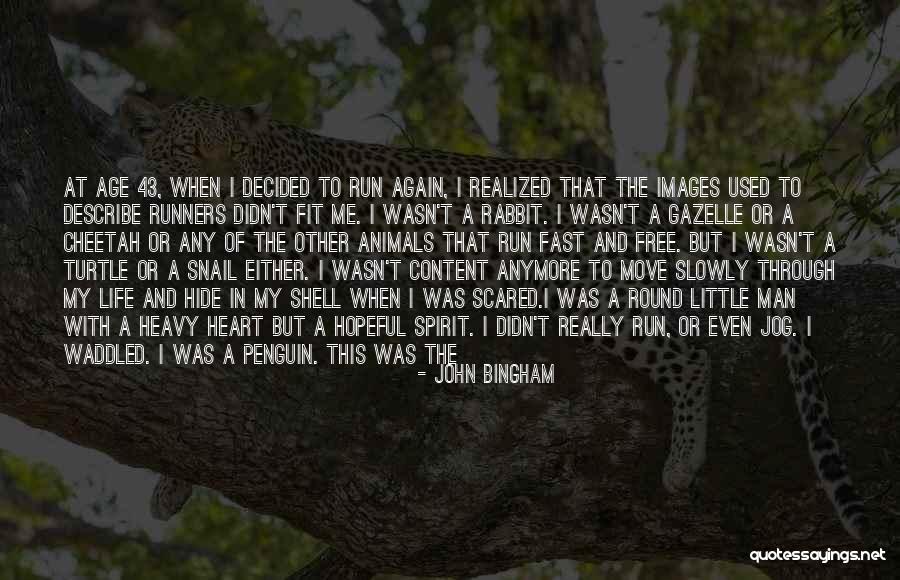
At age 43, when I decided to run again, I realized that the images used to describe runners didn't fit me. I wasn't a rabbit. I wasn't a gazelle or a cheetah or any of the other animals that run fast and free. But I wasn't a turtle or a snail either. I wasn't content anymore to move slowly through my life and hide in my shell when I was scared.
I was a round little man with a heavy heart but a hopeful spirit. I didn't really run, or even jog. I waddled. I was a Penguin. This was the image that fit. Emperor-proud, I stand tallto face the elements of my life. Yes, I am round. Yes, I am slow. Yes, I run as thought my legs are tied together at the knees. But I am running. And that is all that matters. — John Bingham
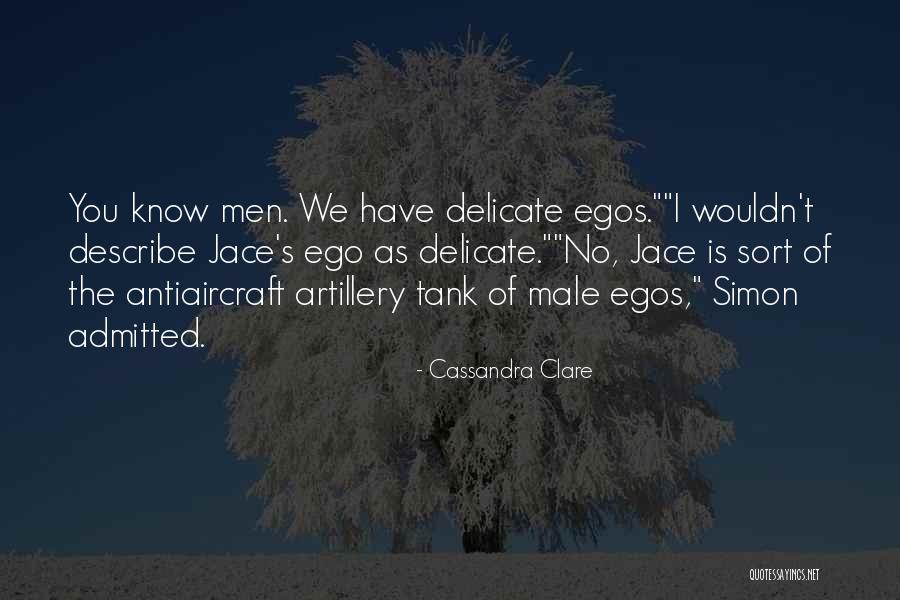
You know men. We have delicate egos."
"I wouldn't describe Jace's ego as delicate."
"No, Jace is sort of the antiaircraft artillery tank of male egos," Simon admitted. — Cassandra Clare
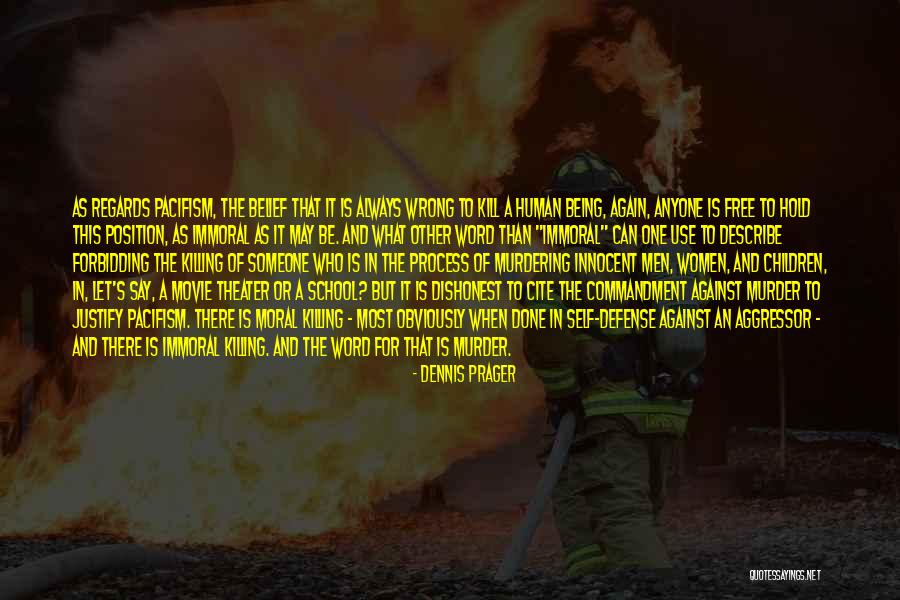
As regards pacifism, the belief that it is always wrong to kill a human being, again, anyone is free to hold this position, as immoral as it may be. And what other word than "immoral" can one use to describe forbidding the killing of someone who is in the process of murdering innocent men, women, and children, in, let's say, a movie theater or a school? But it is dishonest to cite the commandment against murder to justify pacifism. There is moral killing - most obviously when done in self-defense against an aggressor - and there is immoral killing. And the word for that is murder. — Dennis Prager
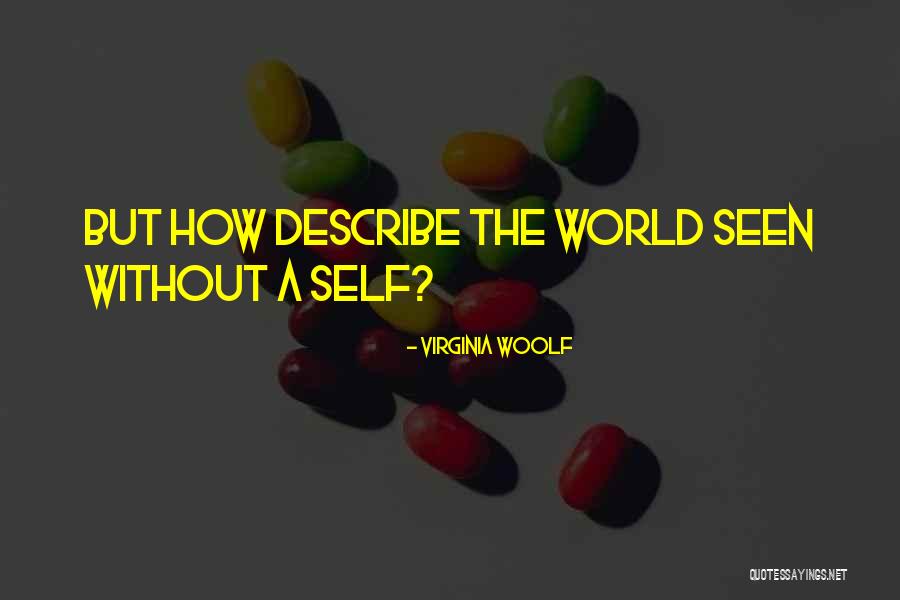
But how describe the world seen without a self? — Virginia Woolf
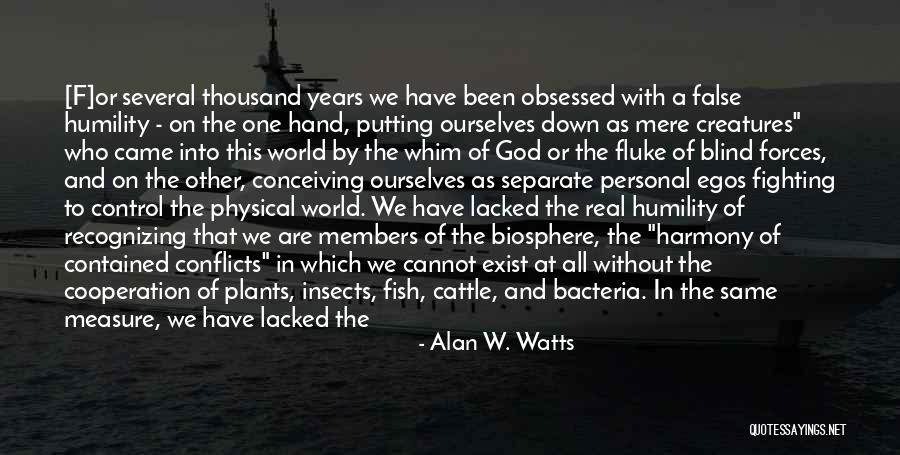
[F]or several thousand years we have been obsessed with a false humility - on the one hand, putting ourselves down as mere creatures" who came into this world by the whim of God or the fluke of blind forces, and on the other, conceiving ourselves as separate personal egos fighting to control the physical world. We have lacked the real humility of recognizing that we are members of the biosphere, the "harmony of contained conflicts" in which we cannot exist at all without the cooperation of plants, insects, fish, cattle, and bacteria. In the same measure, we have lacked the proper self-respect of recognizing that I, the individual organism, am a structure of such fabulous ingenuity that it calls the whole universe into being. In the act of putting everything at a distance so as to describe and control it, we have orphaned ourselves both from the surrounding world and from our own bodies - leaving "I" as a discontented and alienated spook, anxious, guilty, unrelated, and alone. — Alan W. Watts
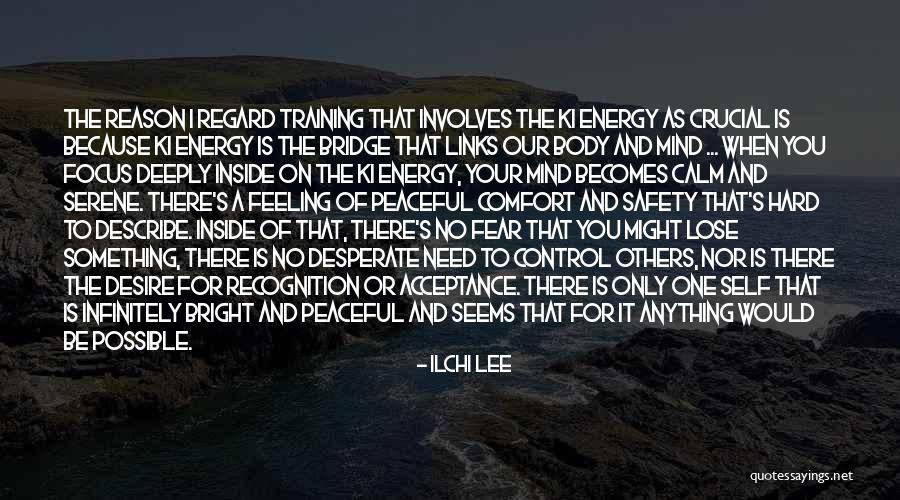
The reason I regard training that involves the ki energy as crucial is because ki energy is the bridge that links our body and mind ... when you focus deeply inside on the ki energy, your mind becomes calm and serene. There's a feeling of peaceful comfort and safety that's hard to describe. Inside of that, there's no fear that you might lose something, there is no desperate need to control others, nor is there the desire for recognition or acceptance. There is only one self that is infinitely bright and peaceful and seems that for it anything would be possible. — Ilchi Lee
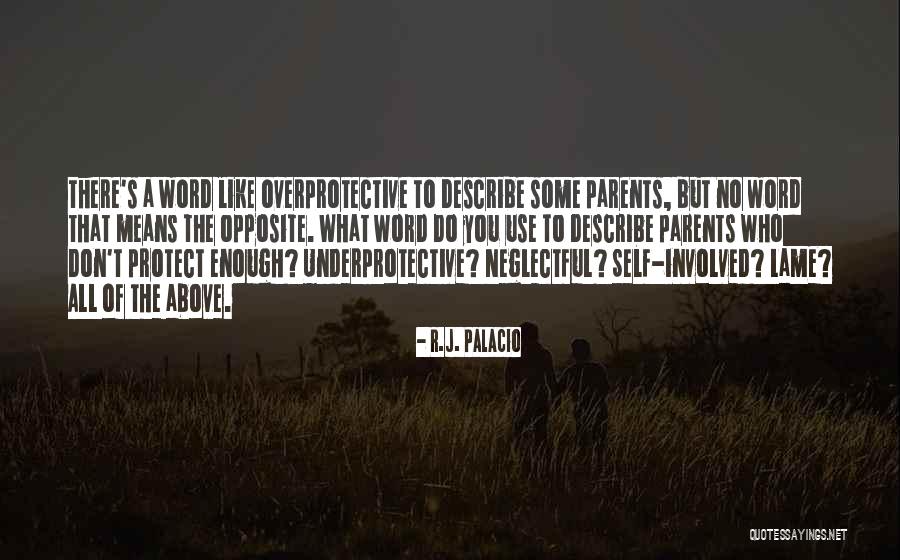
There's a word like overprotective to describe some parents, but no word that means the opposite. What word do you use to describe parents who don't protect enough? Underprotective? Neglectful? Self-involved? Lame? All of the above. — R.J. Palacio
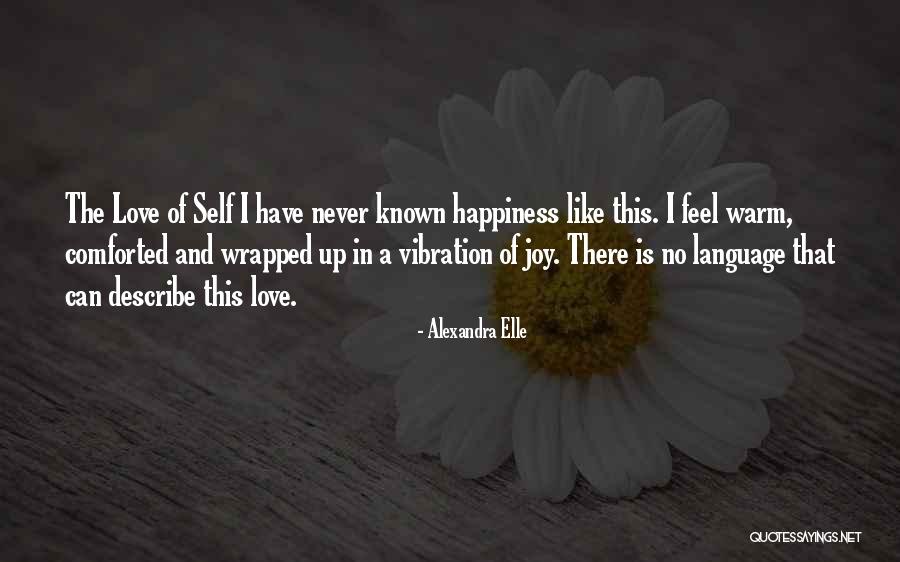
The Love of Self I have never known happiness like this. I feel warm, comforted and wrapped up in a vibration of joy. There is no language that can describe this love. — Alexandra Elle
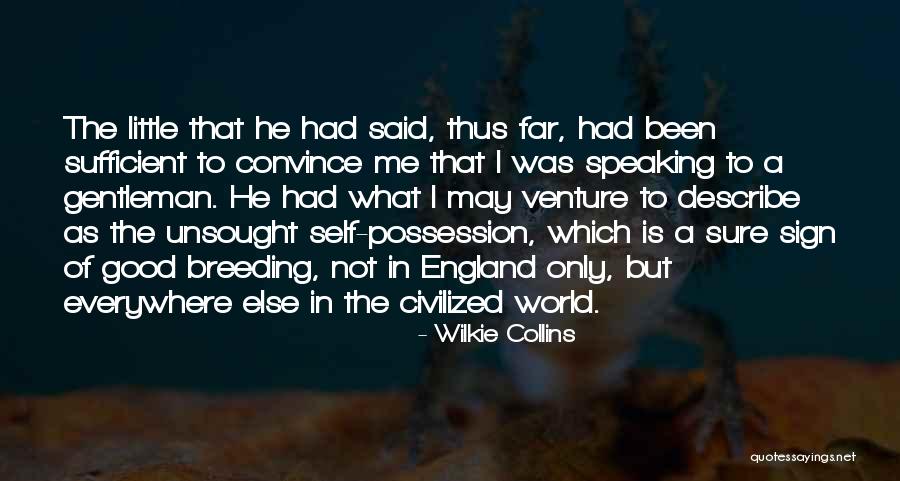
The little that he had said, thus far, had been sufficient to convince me that I was speaking to a gentleman. He had what I may venture to describe as the unsought self-possession, which is a sure sign of good breeding, not in England only, but everywhere else in the civilized world. — Wilkie Collins
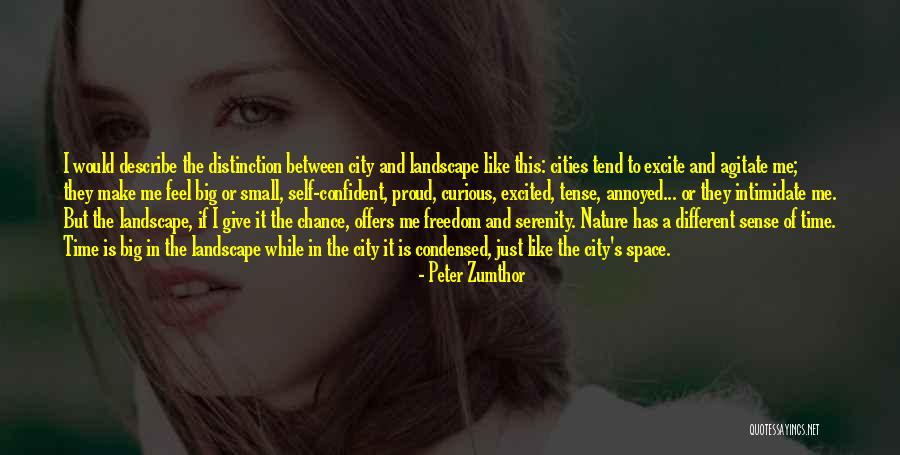
I would describe the distinction between city and landscape like this: cities tend to excite and agitate me; they make me feel big or small, self-confident, proud, curious, excited, tense, annoyed... or they intimidate me. But the landscape, if I give it the chance, offers me freedom and serenity. Nature has a different sense of time. Time is big in the landscape while in the city it is condensed, just like the city's space. — Peter Zumthor
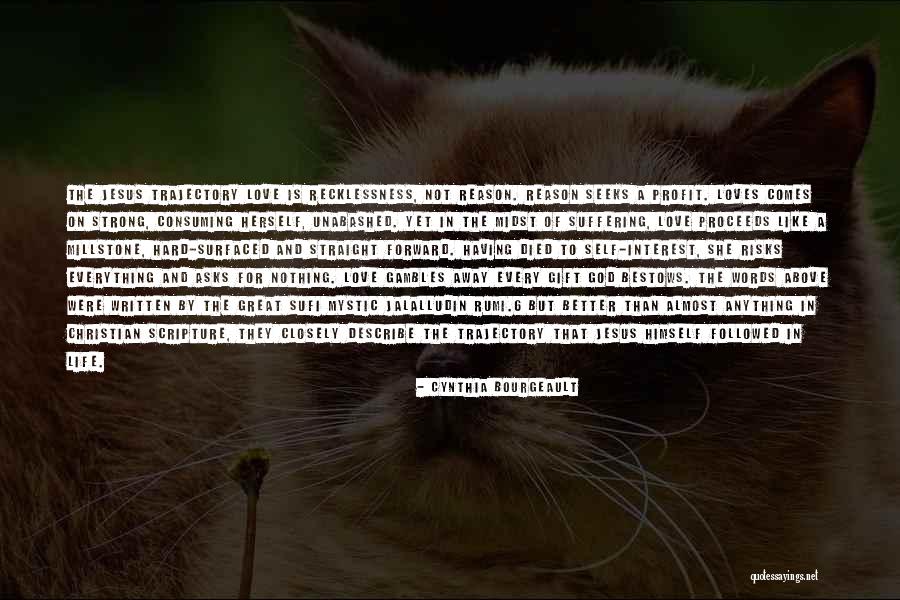
The Jesus Trajectory Love is recklessness, not reason. Reason seeks a profit. Loves comes on strong, consuming herself, unabashed. Yet in the midst of suffering, Love proceeds like a millstone, hard-surfaced and straight forward. Having died to self-interest, she risks everything and asks for nothing. Love gambles away every gift God bestows. The words above were written by the great Sufi mystic Jalalludin Rumi.6 But better than almost anything in Christian scripture, they closely describe the trajectory that Jesus himself followed in life. — Cynthia Bourgeault
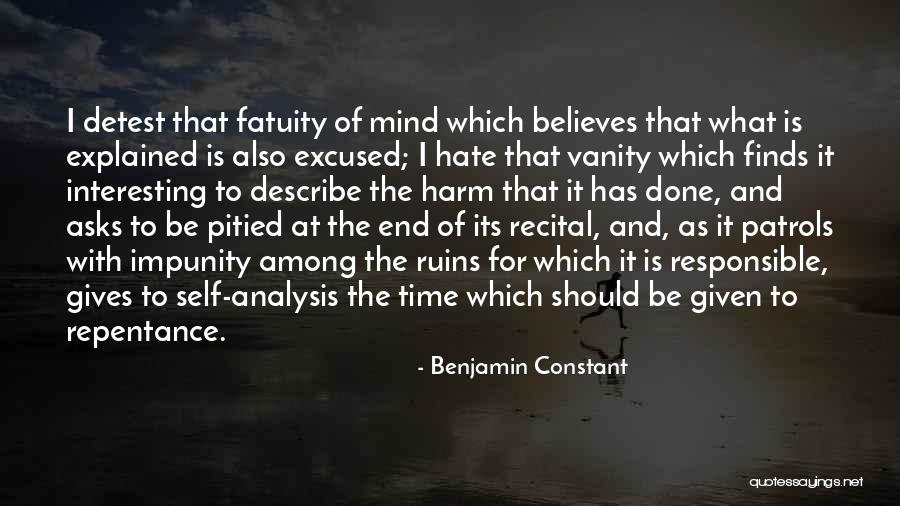
I detest that fatuity of mind which believes that what is explained is also excused; I hate that vanity which finds it interesting to describe the harm that it has done, and asks to be pitied at the end of its recital, and, as it patrols with impunity among the ruins for which it is responsible, gives to self-analysis the time which should be given to repentance. — Benjamin Constant
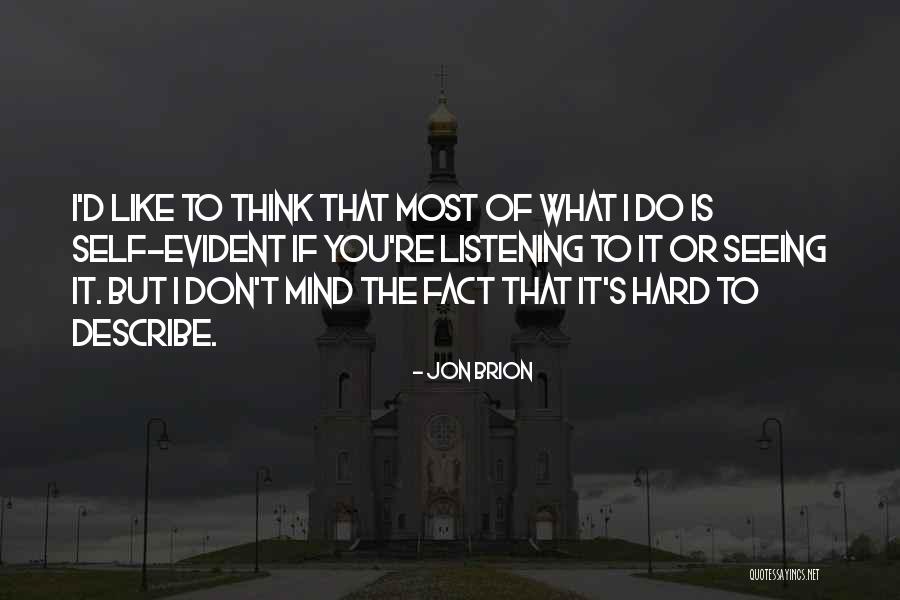
I'd like to think that most of what I do is self-evident if you're listening to it or seeing it. But I don't mind the fact that it's hard to describe. — Jon Brion
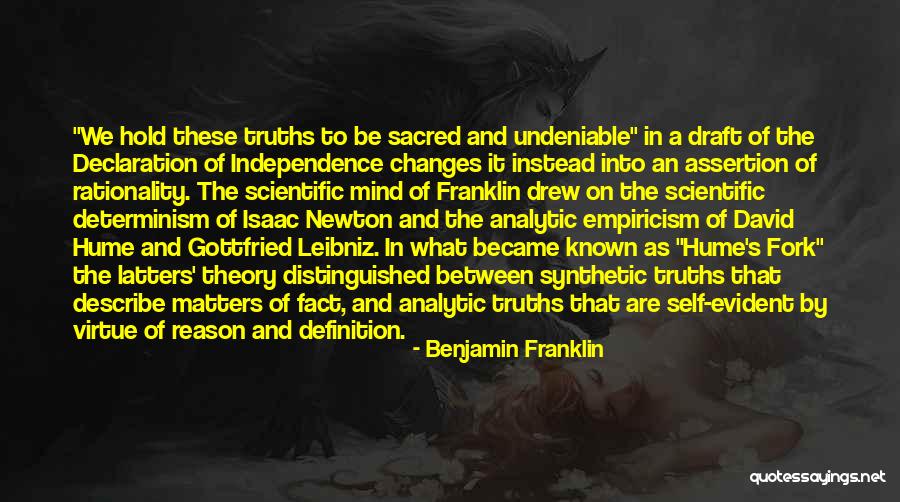
"We hold these truths to be sacred and undeniable" in a draft of the Declaration of Independence changes it instead into an assertion of rationality. The scientific mind of Franklin drew on the scientific determinism of Isaac Newton and the analytic empiricism of David Hume and Gottfried Leibniz. In what became known as "Hume's Fork" the latters' theory distinguished between synthetic truths that describe matters of fact, and analytic truths that are self-evident by virtue of reason and definition. — Benjamin Franklin
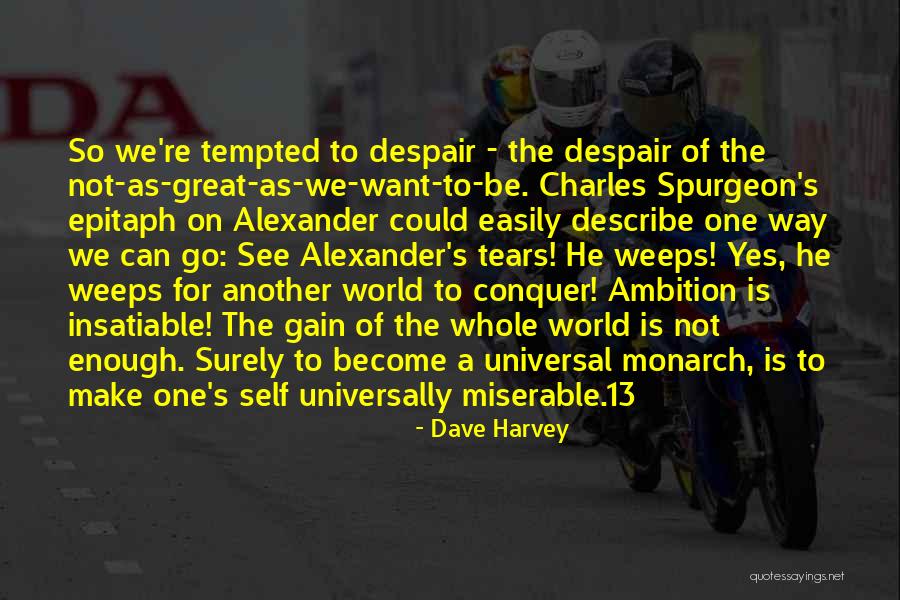
So we're tempted to despair - the despair of the not-as-great-as-we-want-to-be. Charles Spurgeon's epitaph on Alexander could easily describe one way we can go: See Alexander's tears! He weeps! Yes, he weeps for another world to conquer! Ambition is insatiable! The gain of the whole world is not enough. Surely to become a universal monarch, is to make one's self universally miserable.13 — Dave Harvey
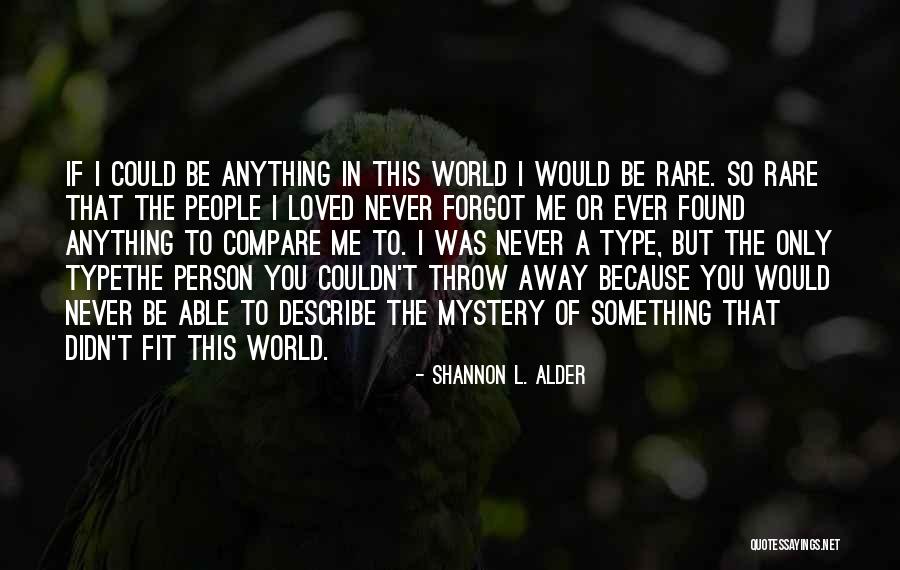
If I could be anything in this world I would be rare. So rare that the people I loved never forgot me or ever found anything to compare me to. I was never a type, but the only type
the person you couldn't throw away because you would never be able to describe the mystery of something that didn't fit this world. — Shannon L. Alder
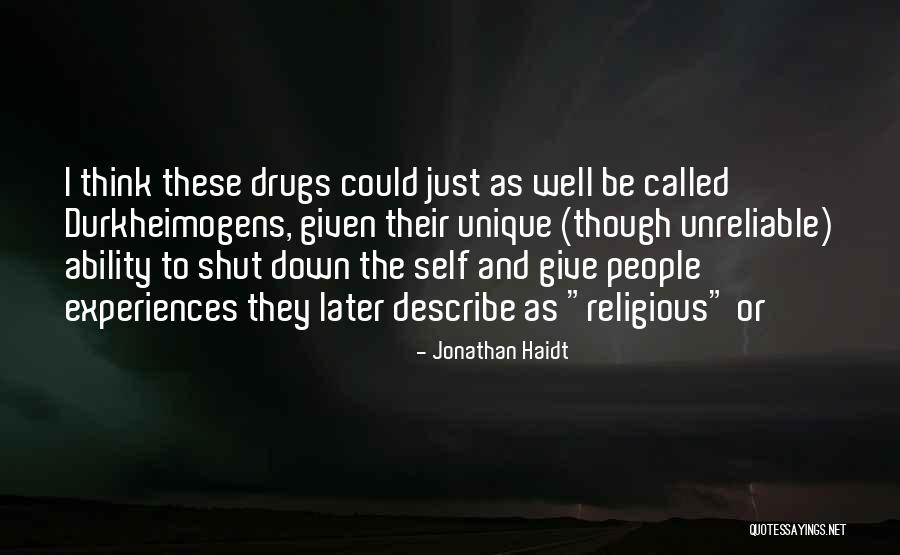
I think these drugs could just as well be called Durkheimogens, given their unique (though unreliable) ability to shut down the self and give people experiences they later describe as "religious" or — Jonathan Haidt
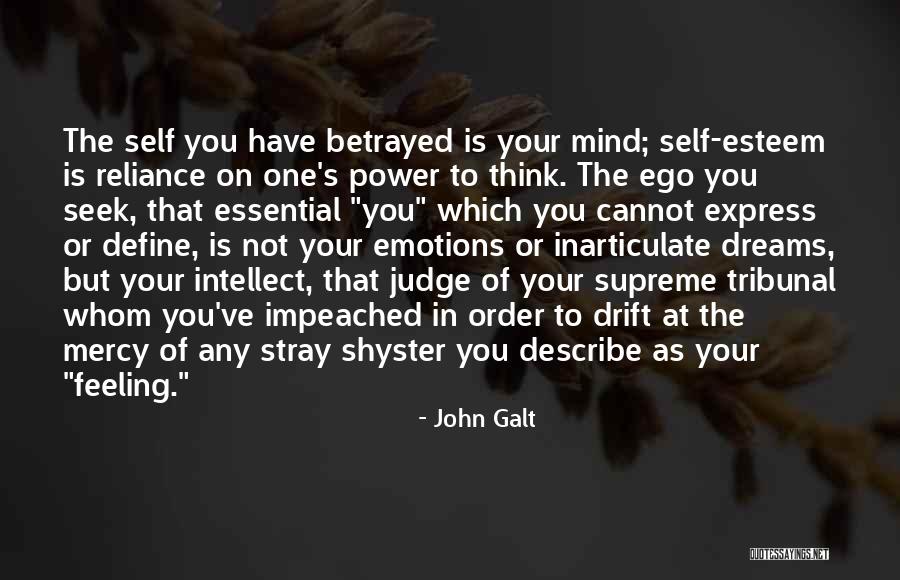
The self you have betrayed is your mind; self-esteem is reliance on one's power to think. The ego you seek, that essential "you" which you cannot express or define, is not your emotions or inarticulate dreams, but your intellect, that judge of your supreme tribunal whom you've impeached in order to drift at the mercy of any stray shyster you describe as your "feeling." — John Galt
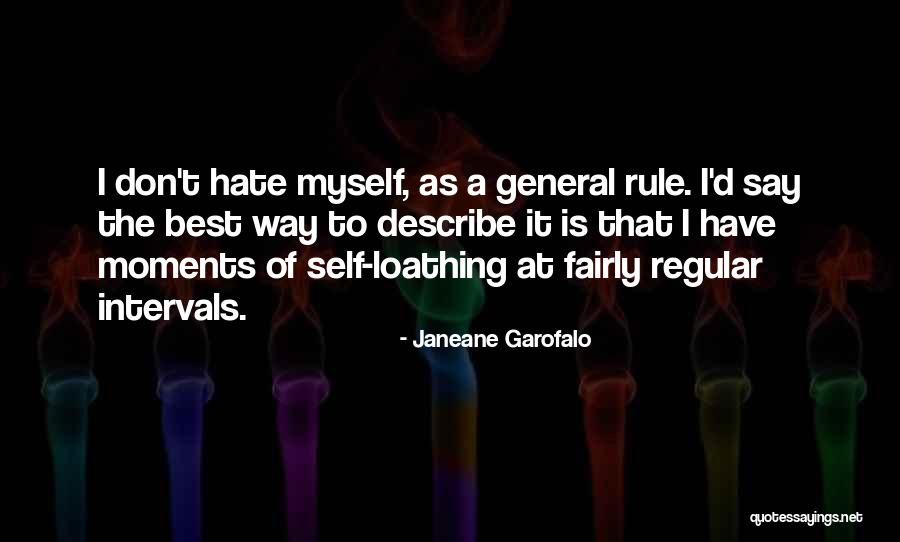
I don't hate myself, as a general rule. I'd say the best way to describe it is that I have moments of self-loathing at fairly regular intervals. — Janeane Garofalo
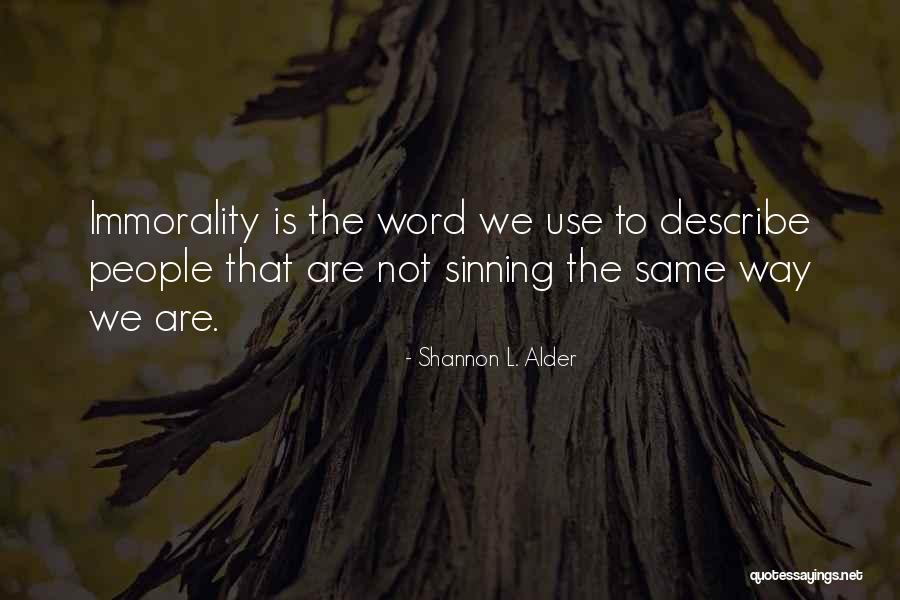
Immorality is the word we use to describe people that are not sinning the same way we are. — Shannon L. Alder
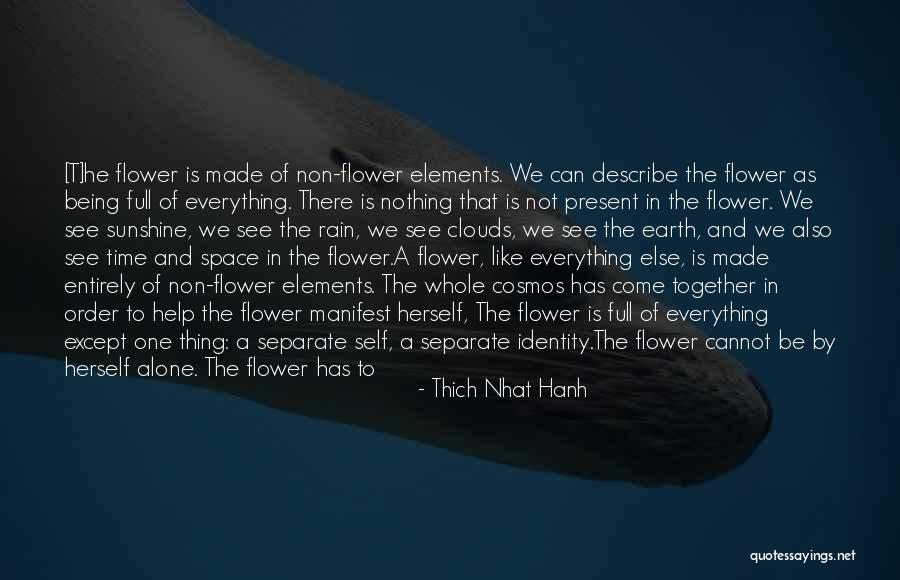
[T]he flower is made of non-flower elements. We can describe the flower as being full of everything. There is nothing that is not present in the flower. We see sunshine, we see the rain, we see clouds, we see the earth, and we also see time and space in the flower.
A flower, like everything else, is made entirely of non-flower elements. The whole cosmos has come together in order to help the flower manifest herself, The flower is full of everything except one thing: a separate self, a separate identity.
The flower cannot be by herself alone. The flower has to inter-be with the sunshine, the cloud and everything in the cosmos. If we understand being in terms of inter-being, then we are much closer to the truth. Inter-being is not being and it is not non-being. Inter-being means being empty of a separate identity, empty of a separate self, — Thich Nhat Hanh
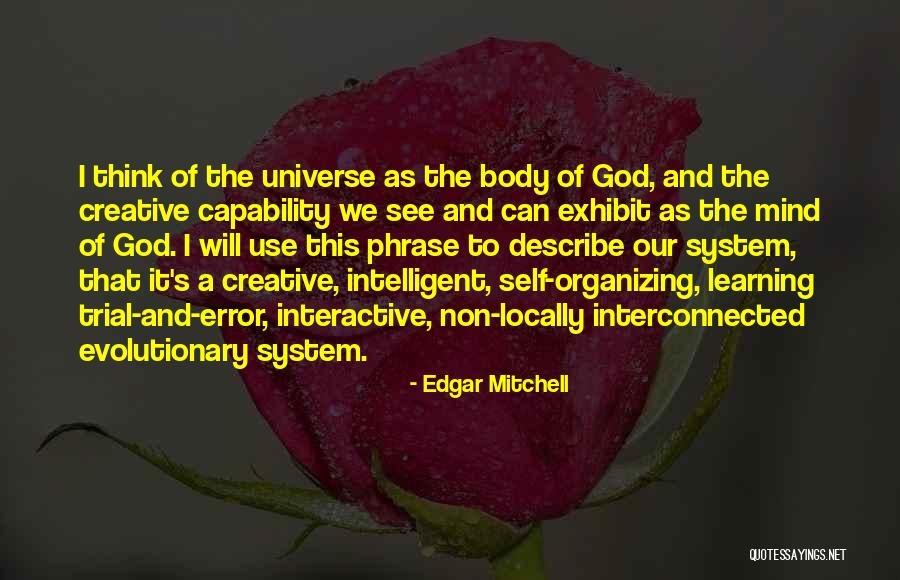
I think of the universe as the body of God, and the creative capability we see and can exhibit as the mind of God. I will use this phrase to describe our system, that it's a creative, intelligent, self-organizing, learning trial-and-error, interactive, non-locally interconnected evolutionary system. — Edgar Mitchell
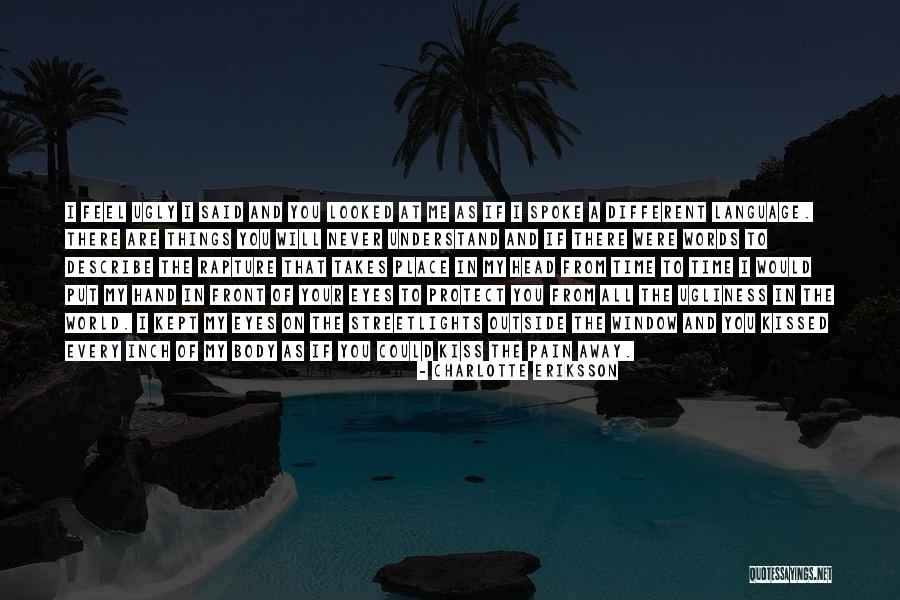
I feel ugly I said and you looked at me as if I spoke a different language. There are things you will never understand and if there were words to describe the rapture that takes place in my head from time to time I would put my hand in front of your eyes to protect you from all the ugliness in the world.
I kept my eyes on the streetlights outside the window and you kissed every inch of my body as if you could kiss the pain away. — Charlotte Eriksson
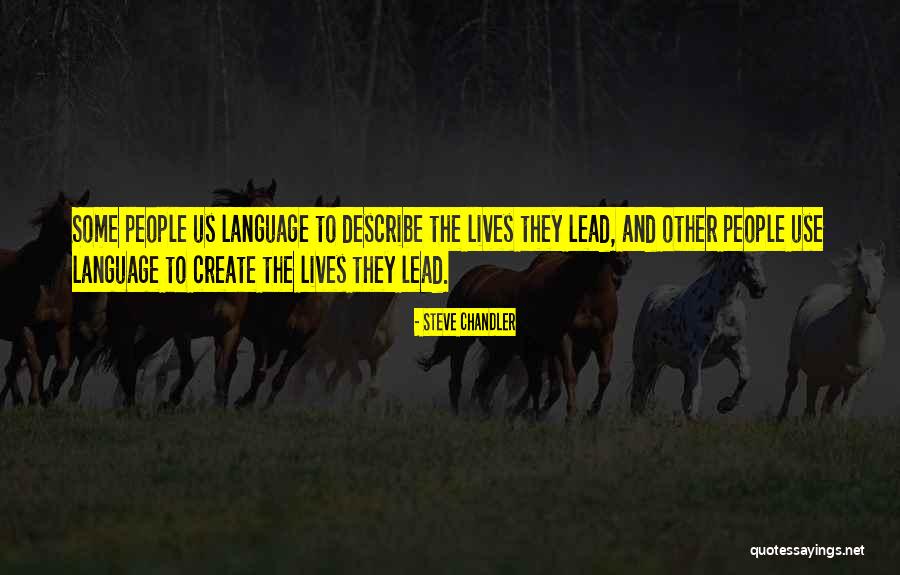
Some people us language to describe the lives they lead, and other people use language to create the lives they lead. — Steve Chandler
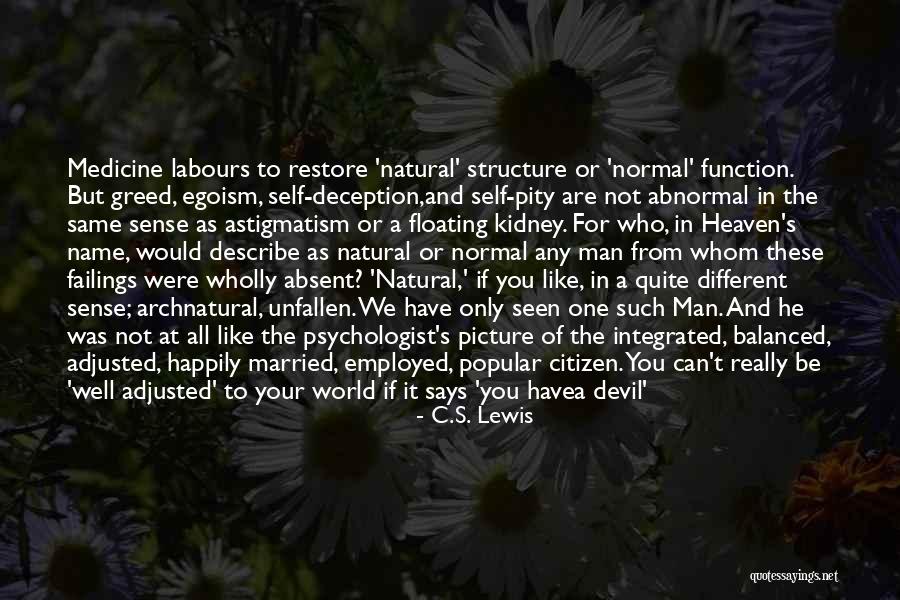
Medicine labours to restore 'natural' structure or 'normal' function. But greed, egoism, self-deception,and self-pity are not abnormal in the same sense as astigmatism or a floating kidney. For who, in Heaven's name, would describe as natural or normal any man from whom these failings were wholly absent? 'Natural,' if you like, in a quite different sense; archnatural, unfallen. We have only seen one such Man. And he was not at all like the psychologist's picture of the integrated, balanced, adjusted, happily married, employed, popular citizen. You can't really be 'well adjusted' to your world if it says 'you havea devil' and ends by nailing you up naked to a stake of wood. — C.S. Lewis
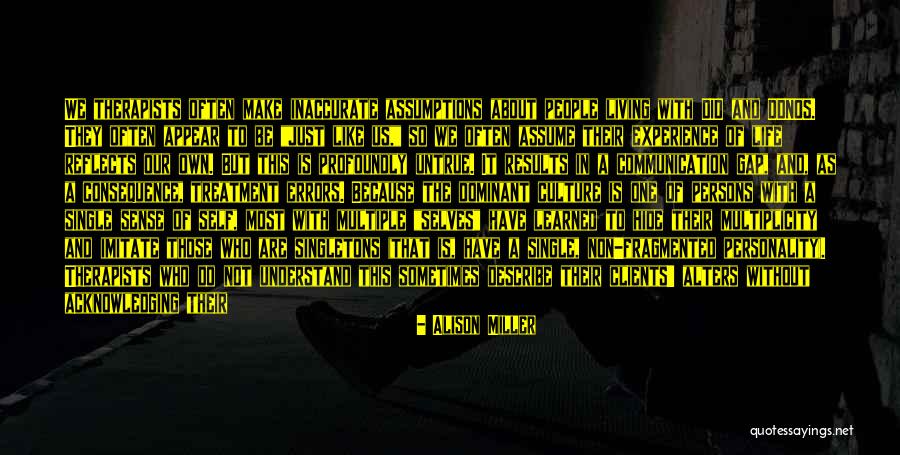
We therapists often make inaccurate assumptions about people living with DID and DDNOS. They often appear to be "just like us," so we often assume their experience of life reflects our own. But this is profoundly untrue. It results in a communication gap, and, as a consequence, treatment errors. Because the dominant culture is one of persons with a single sense of self, most with multiple "selves" have learned to hide their multiplicity and imitate those who are singletons (that is, have a single, non-fragmented personality). Therapists who do not understand this sometimes describe their clients' alters without acknowledging their dissociation, saying only that they have different "moods." In overlooking dissociation, this description fails to recognize the essential truth of such disorders, and of the alters. It was difficult for me to comprehend what life was like for my first few dissociative clients. — Alison Miller
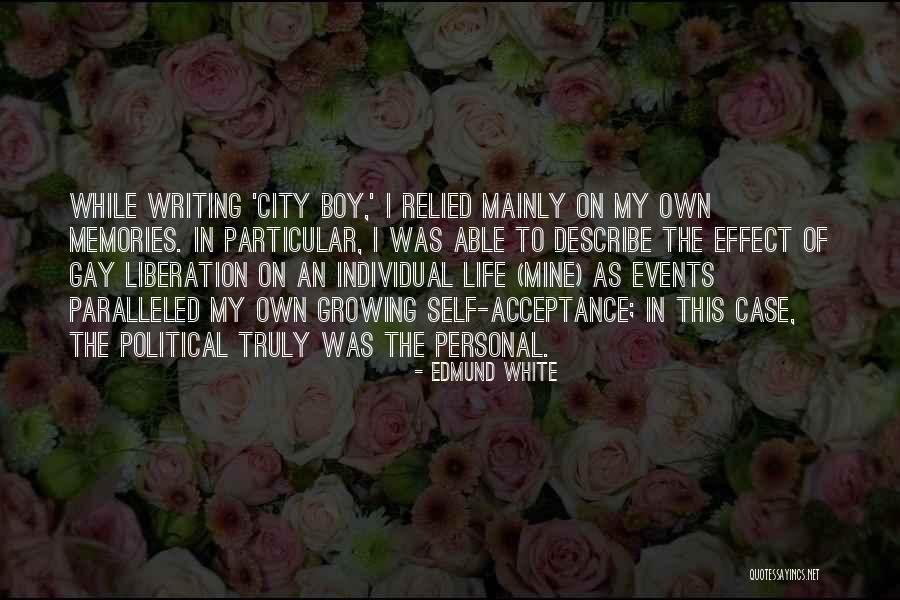
While writing 'City Boy,' I relied mainly on my own memories. In particular, I was able to describe the effect of gay liberation on an individual life (mine) as events paralleled my own growing self-acceptance; in this case, the political truly was the personal. — Edmund White
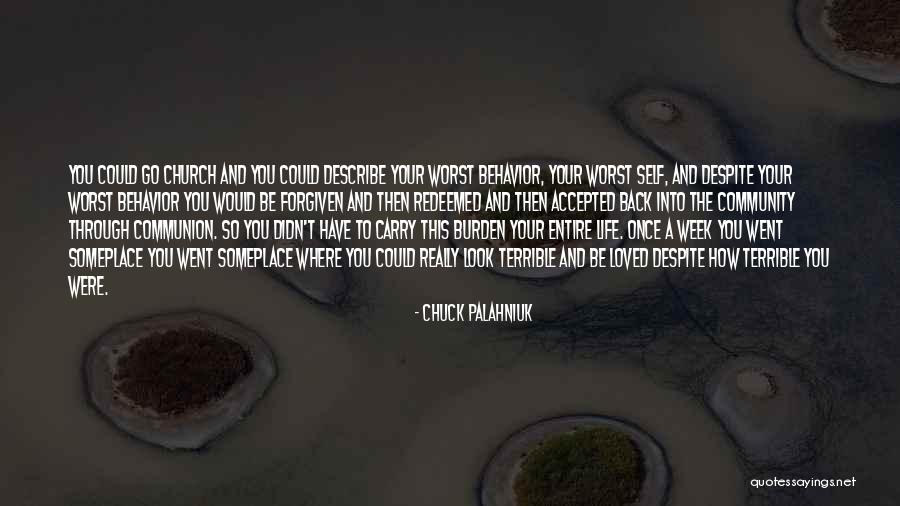
You could go church and you could describe your worst behavior, your worst self, and despite your worst behavior you would be forgiven and then redeemed and then accepted back into the community through communion. So you didn't have to carry this burden your entire life. Once a week you went someplace you went someplace where you could really look terrible and be loved despite how terrible you were. — Chuck Palahniuk
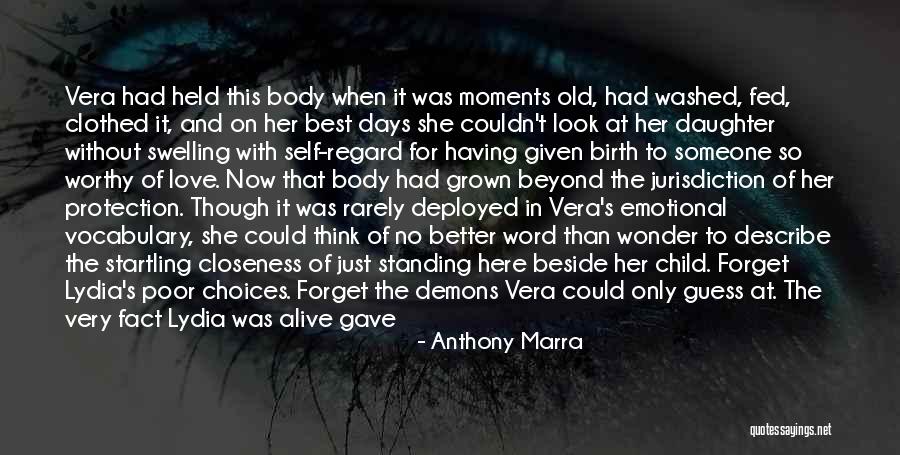
Vera had held this body when it was moments old, had washed, fed, clothed it, and on her best days she couldn't look at her daughter without swelling with self-regard for having given birth to someone so worthy of love. Now that body had grown beyond the jurisdiction of her protection. Though it was rarely deployed in Vera's emotional vocabulary, she could think of no better word than wonder to describe the startling closeness of just standing here beside her child. Forget Lydia's poor choices. Forget the demons Vera could only guess at. The very fact Lydia was alive gave her mother the faith to believe she had done this one thing right. — Anthony Marra
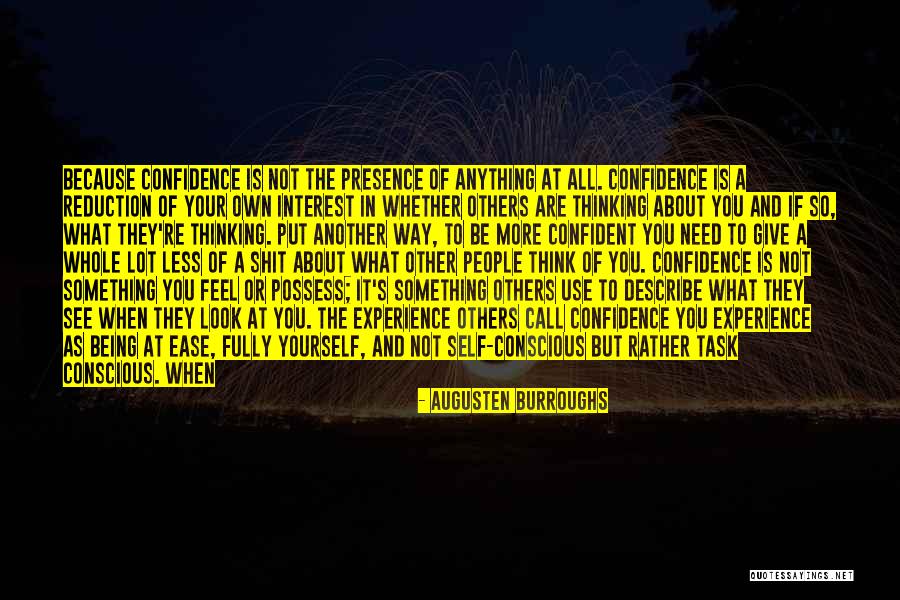
Because confidence is not the presence of anything at all. Confidence is a reduction of your own interest in whether others are thinking about you and if so, what they're thinking. Put another way, to be more confident you need to give a whole lot less of a shit about what other people think of you. Confidence is not something you feel or possess; it's something others use to describe what they see when they look at you. The experience others call confidence you experience as being at ease, fully yourself, and not self-conscious but rather task conscious. When — Augusten Burroughs

At the same time that "self-made" entered the nation's lexicon, so did the notion of abject failure. Once reserved to describe a discrete financial episode - "I made a failure," a merchant would say after losing his shop - "failure" in antebellum America became a matter of identity, describing not an event but a person. As the historian Scott Sandage explains in Born Losers: A History of Failure in America, the phrase "I feel like a failure" comes to us so naturally today "that we forget it is a figure of speech: the language of business applied to the soul." It became conventional wisdom in the early nineteenth century, Sandage explains, that people who failed had a problem native to their constitution. They weren't just losers; they were "born losers. — Joshua Wolf Shenk
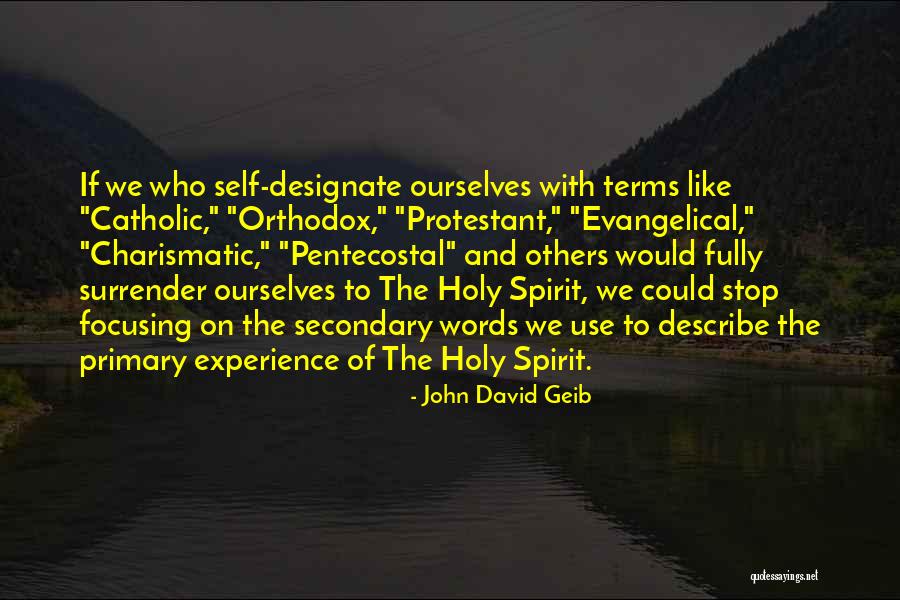
If we who self-designate ourselves with terms like "Catholic," "Orthodox," "Protestant," "Evangelical," "Charismatic," "Pentecostal" and others would fully surrender ourselves to The Holy Spirit, we could stop focusing on the secondary words we use to describe the primary experience of The Holy Spirit. — John David Geib
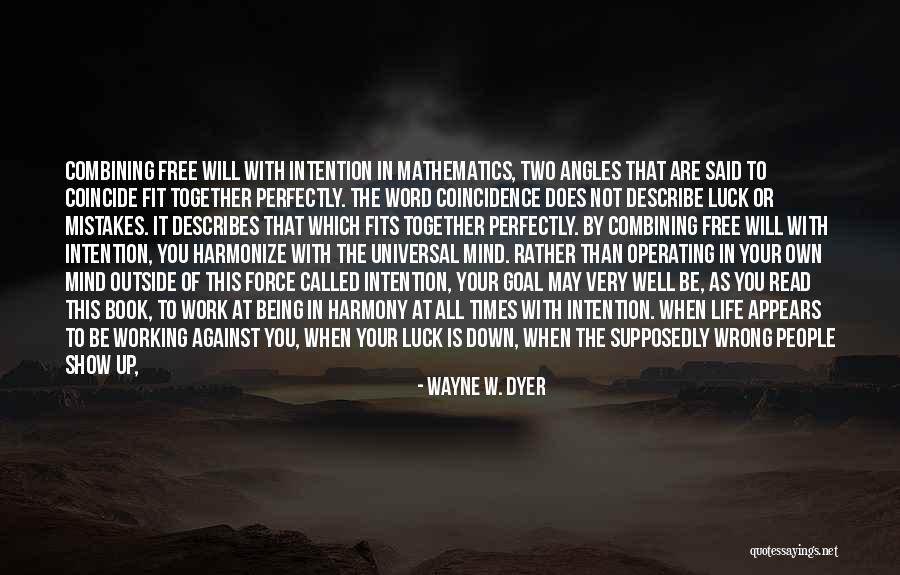
Combining Free Will with Intention In mathematics, two angles that are said to coincide fit together perfectly. The word coincidence does not describe luck or mistakes. It describes that which fits together perfectly. By combining free will with intention, you harmonize with the universal mind. Rather than operating in your own mind outside of this force called intention, your goal may very well be, as you read this book, to work at being in harmony at all times with intention. When life appears to be working against you, when your luck is down, when the supposedly wrong people show up, or when you slip up and return to old, self-defeating habits, recognize the signs that you're out of harmony with intention. You can and will reconnect in a way that will bring you into alignment with your own purpose. — Wayne W. Dyer
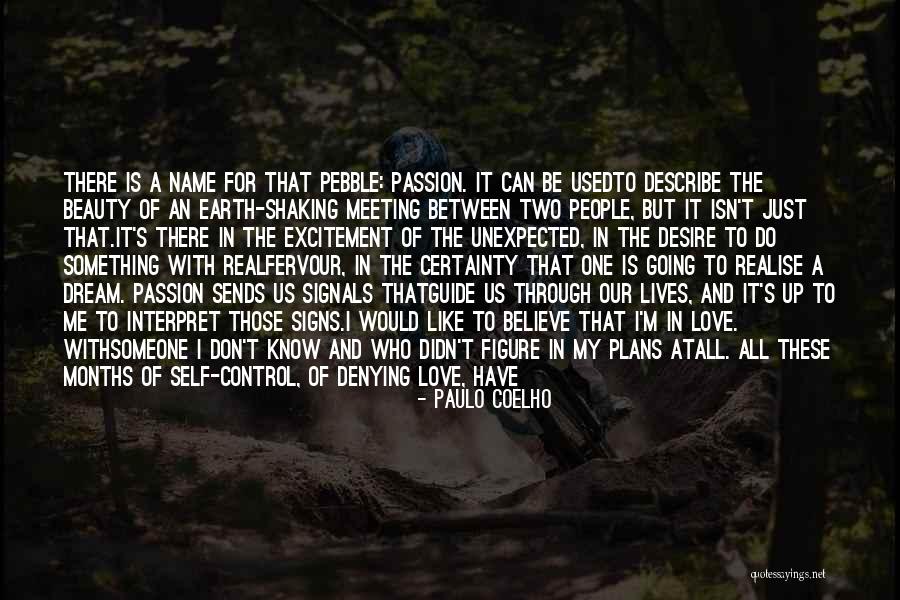
There is a name for that pebble: passion. It can be used
to describe the beauty of an earth-shaking meeting between two people, but it isn't just that.
It's there in the excitement of the unexpected, in the desire to do something with real
fervour, in the certainty that one is going to realise a dream. Passion sends us signals that
guide us through our lives, and it's up to me to interpret those signs.
I would like to believe that I'm in love. With
someone I don't know and who didn't figure in my plans at
all. All these months of self-control, of denying love, have had exactly the opposite result: I
have let myself be swept away by the first person to treat me a little differently. — Paulo Coelho
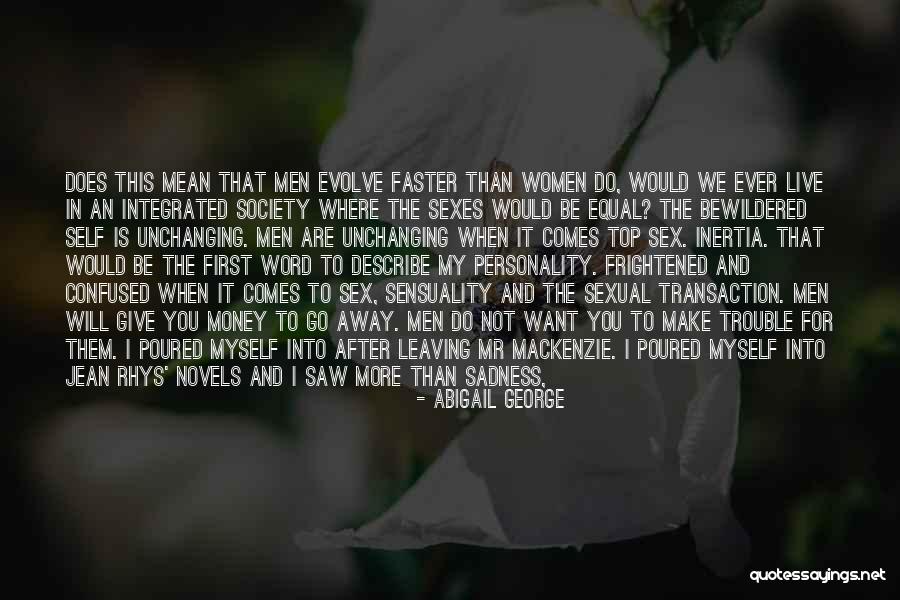
Does this mean that men evolve faster than women do, would we ever live in an integrated society where the sexes would be equal? The bewildered self is unchanging. Men are unchanging when it comes top sex. Inertia. That would be the first word to describe my personality. Frightened and confused when it comes to sex, sensuality and the sexual transaction. Men will give you money to go away. Men do not want you to make trouble for them. I poured myself into After Leaving Mr Mackenzie. I poured myself into Jean Rhys' novels and I saw more than sadness, suffering, losing youth there. I saw human rights. The men perhaps had all the power because they had the money but who was the greater, the woman or the man with her beguiling attractiveness, her youthful appeal, her attractiveness. — Abigail George
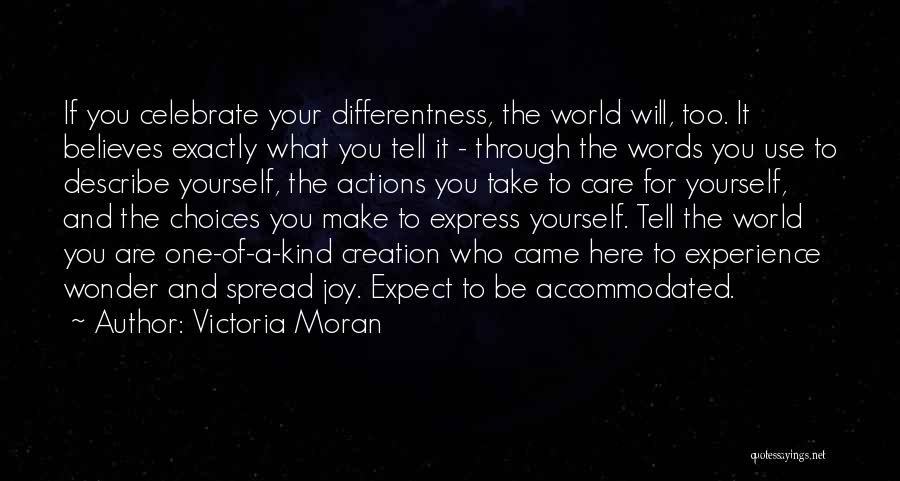
If you celebrate your differentness, the world will, too. It believes exactly what you tell it - through the words you use to describe yourself, the actions you take to care for yourself, and the choices you make to express yourself. Tell the world you are one-of-a-kind creation who came here to experience wonder and spread joy. Expect to be accommodated. — Victoria Moran
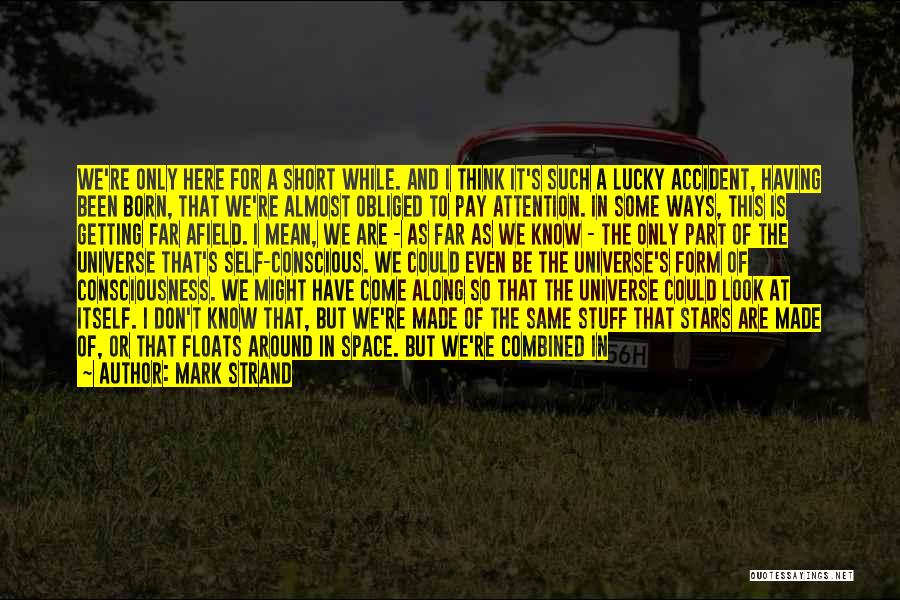
We're only here for a short while. And I think it's such a lucky accident, having been born, that we're almost obliged to pay attention. In some ways, this is getting far afield. I mean, we are - as far as we know - the only part of the universe that's self-conscious. We could even be the universe's form of consciousness. We might have come along so that the universe could look at itself. I don't know that, but we're made of the same stuff that stars are made of, or that floats around in space. But we're combined in such a way that we can describe what it's like to be alive, to be witnesses. Most of our experience is that of being a witness. We see and hear and smell other things. I think being alive is responding. — Mark Strand
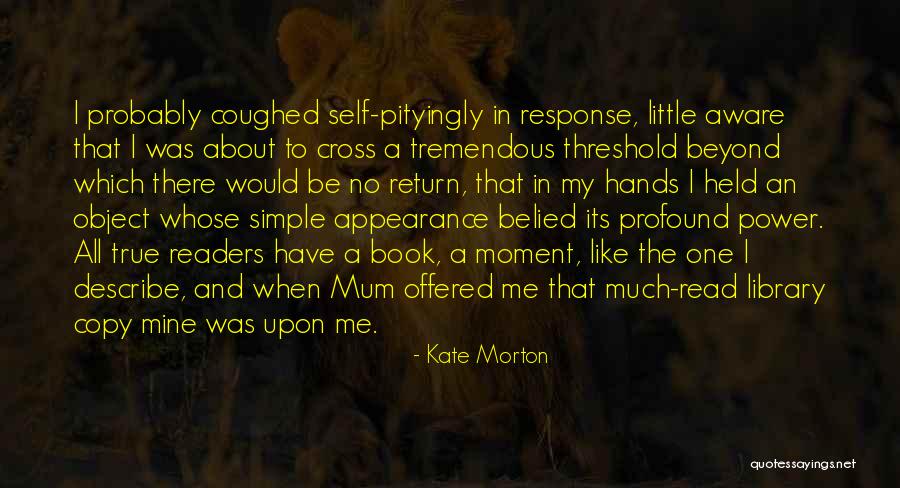
I probably coughed self-pityingly in response, little aware that I was about to cross a tremendous threshold beyond which there would be no return, that in my hands I held an object whose simple appearance belied its profound power. All true readers have a book, a moment, like the one I describe, and when Mum offered me that much-read library copy mine was upon me. — Kate Morton
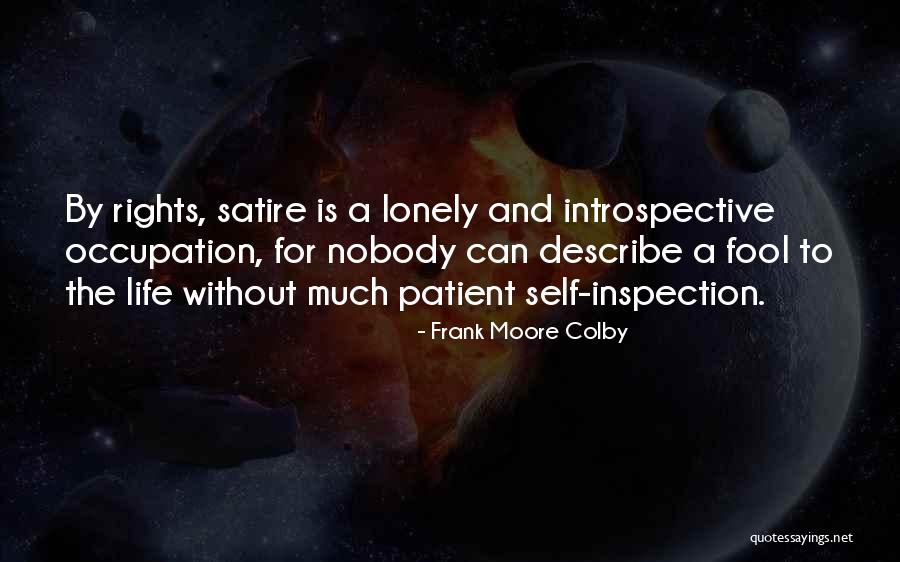
By rights, satire is a lonely and introspective occupation, for nobody can describe a fool to the life without much patient self-inspection. — Frank Moore Colby
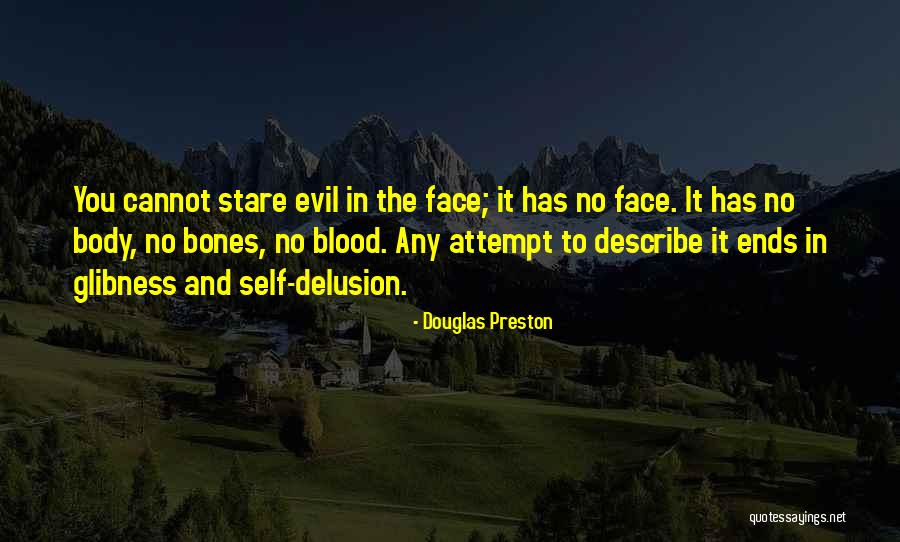
You cannot stare evil in the face; it has no face. It has no body, no bones, no blood. Any attempt to describe it ends in glibness and self-delusion. — Douglas Preston
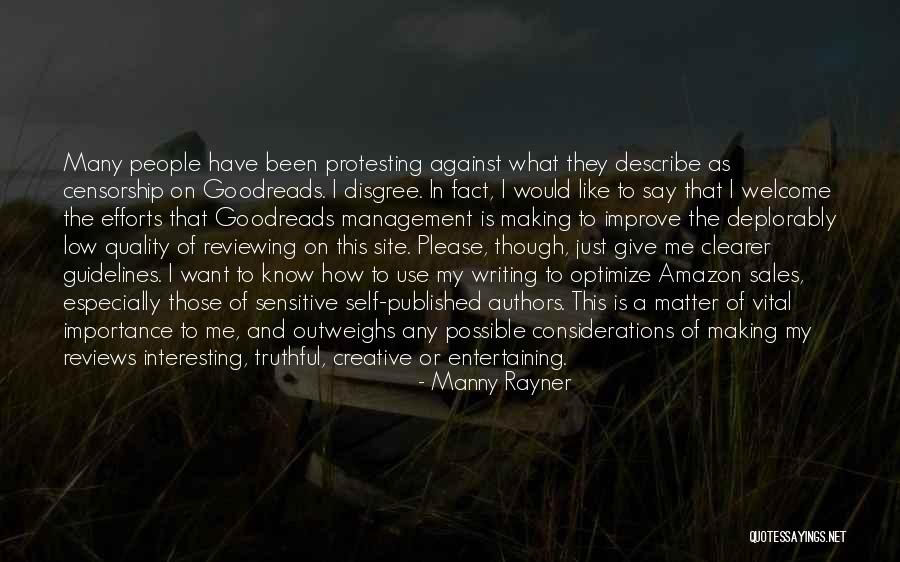
Many people have been protesting against what they describe as censorship on Goodreads. I disgree. In fact, I would like to say that I welcome the efforts that Goodreads management is making to improve the deplorably low quality of reviewing on this site.
Please, though, just give me clearer guidelines. I want to know how to use my writing to optimize Amazon sales, especially those of sensitive self-published authors. This is a matter of vital importance to me, and outweighs any possible considerations of making my reviews interesting, truthful, creative or entertaining. — Manny Rayner
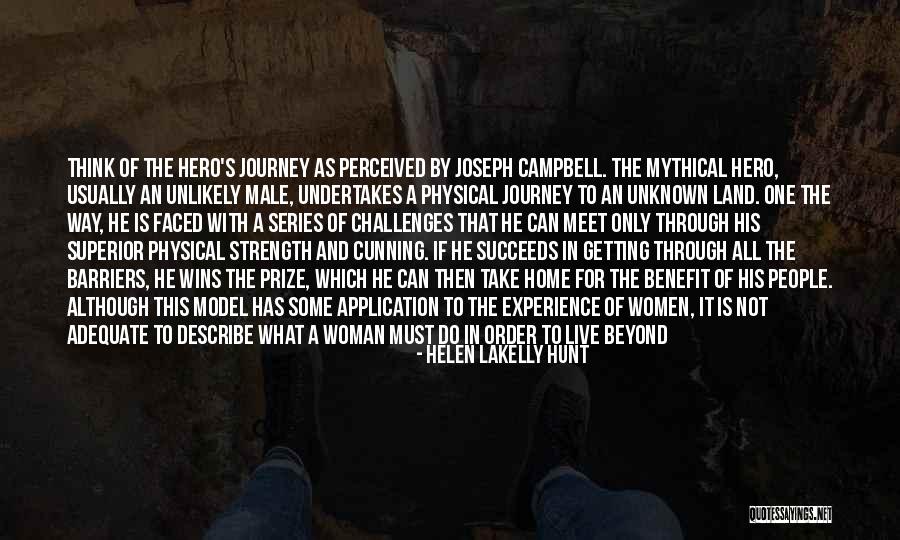
Think of the hero's journey as perceived by Joseph Campbell. The mythical hero, usually an unlikely male, undertakes a physical journey to an unknown land. One the way, he is faced with a series of challenges that he can meet only through his superior physical strength and cunning. If he succeeds in getting through all the barriers, he wins the prize, which he can then take home for the benefit of his people.
Although this model has some application to the experience of women, it is not adequate to describe what a woman must do in order to live beyond the stultifying expectations of the culture in which she's raised. If she has small children, she can't take a trip or move to a new place, and very rarely is she called upon to beat down her opponent with force. Instead, her journey is an inner one where the demons are her demons of the self. Her task as the heroine is to return from her inner journey and share her knowledge, wisdom, and energy with the people around her. — Helen LaKelly Hunt
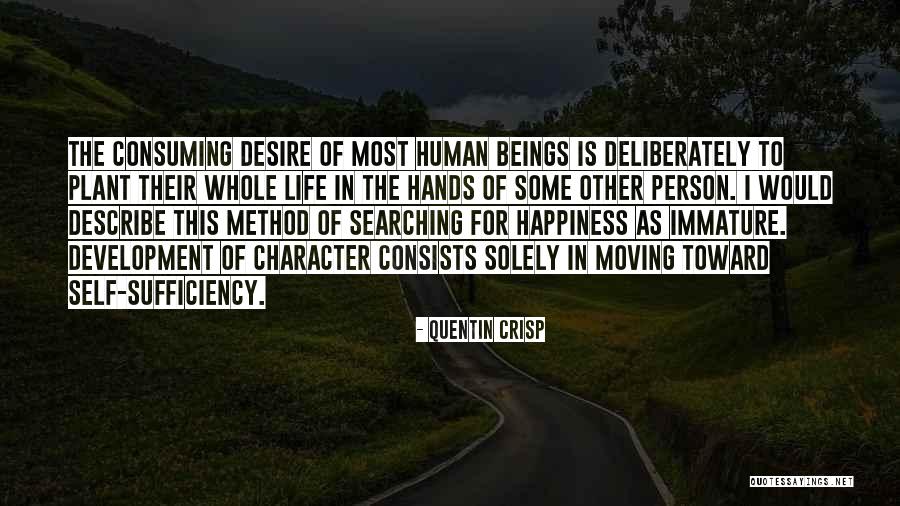
The consuming desire of most human beings is deliberately to plant their whole life in the hands of some other person. I would describe this method of searching for happiness as immature. Development of character consists solely in moving toward self-sufficiency. — Quentin Crisp
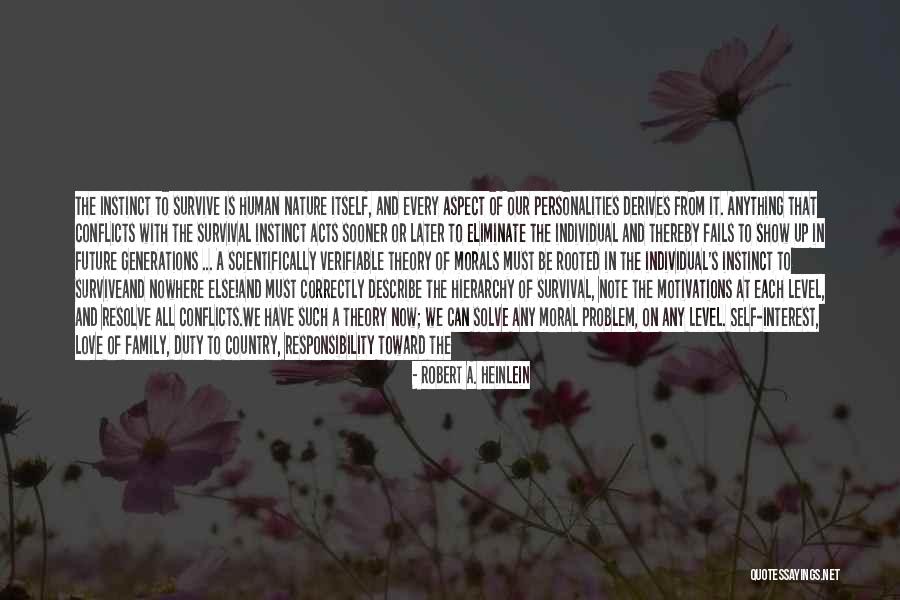
The instinct to survive is human nature itself, and every aspect of our personalities derives from it. Anything that conflicts with the survival instinct acts sooner or later to eliminate the individual and thereby fails to show up in future generations ... A scientifically verifiable theory of morals must be rooted in the individual's instinct to survive
and nowhere else!
and must correctly describe the hierarchy of survival, note the motivations at each level, and resolve all conflicts.
We have such a theory now; we can solve any moral problem, on any level. Self-interest, love of family, duty to country, responsibility toward the human race ...
The basis of all morality is duty, a concept with the same relation to group that self-interest has to individual. — Robert A. Heinlein





